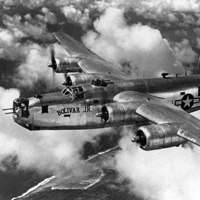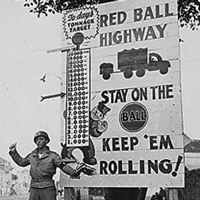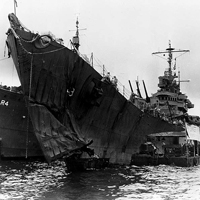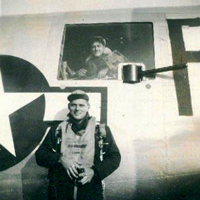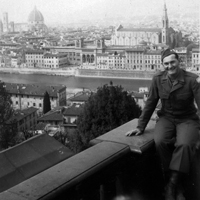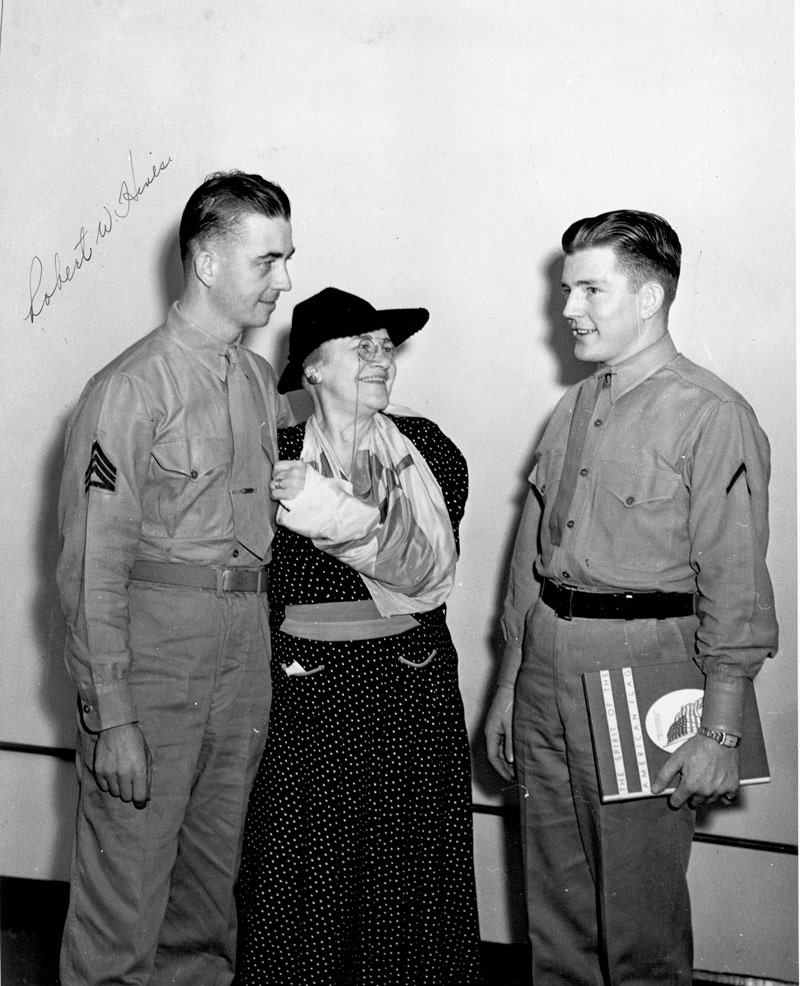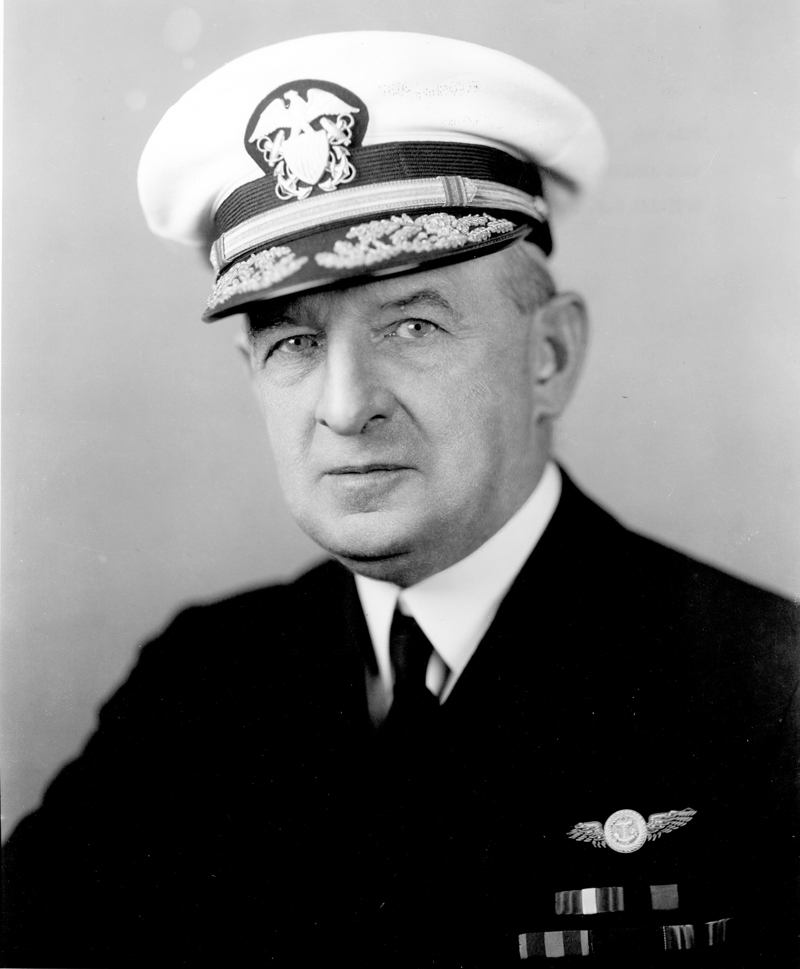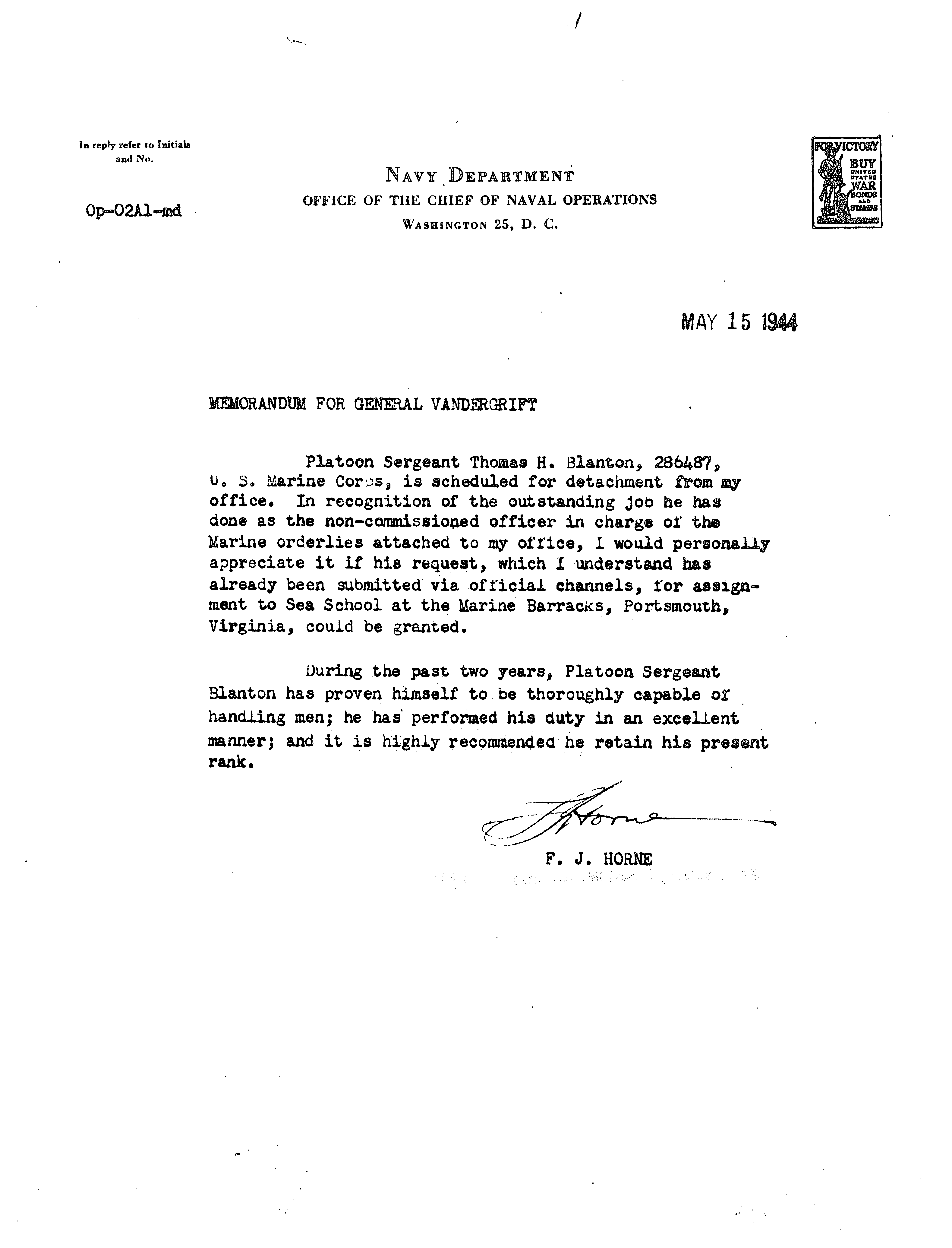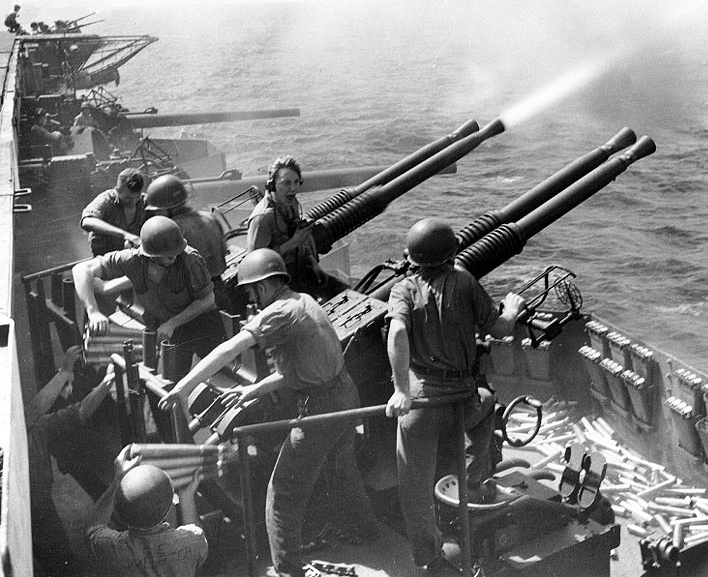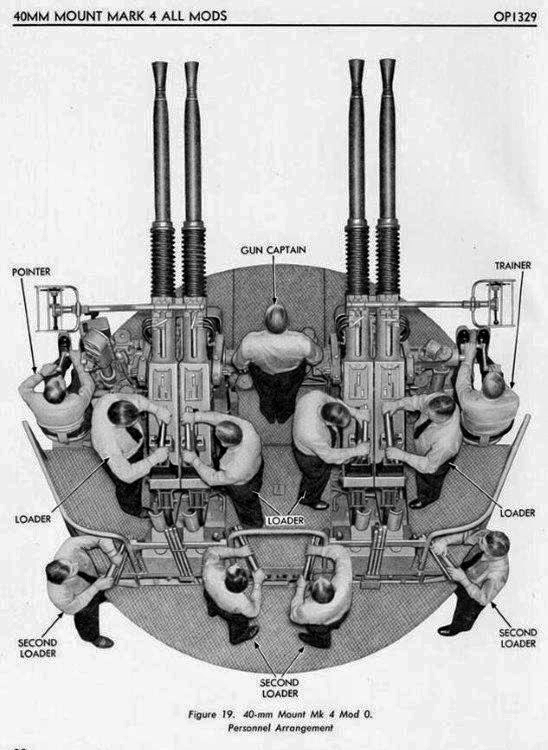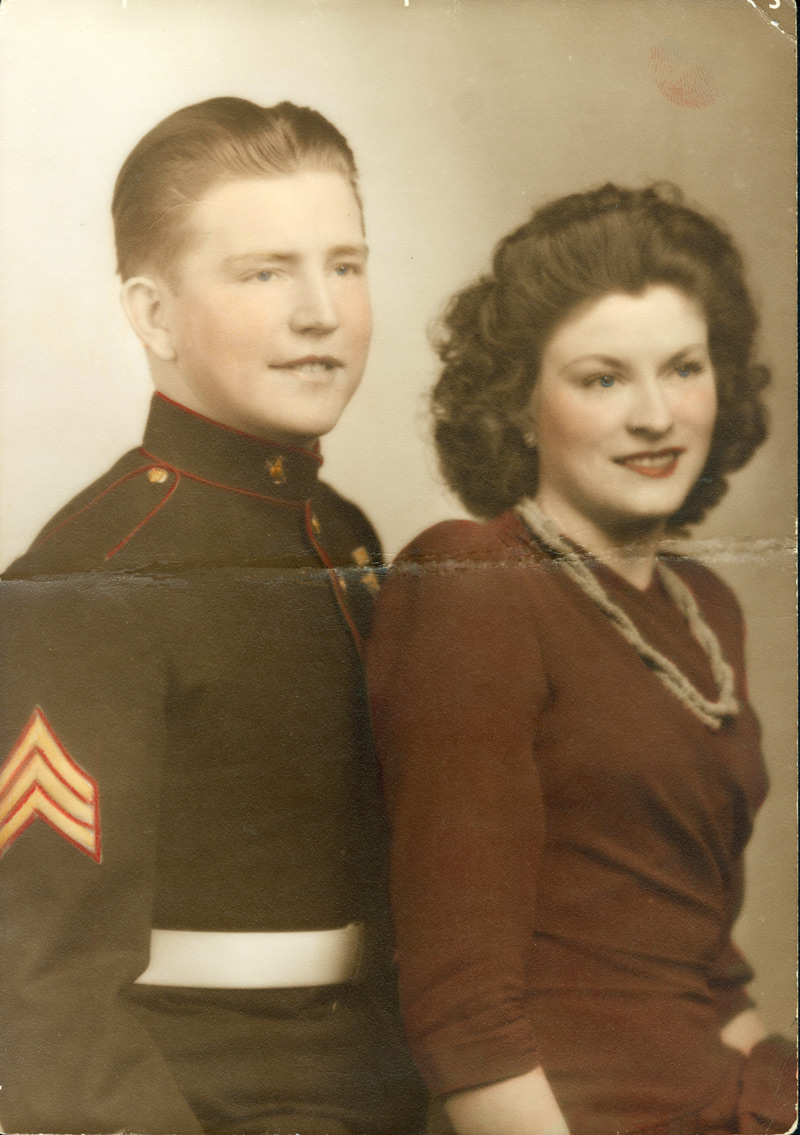
tom blanton
contents—click on a chapter
1—Early life, 3-C camp, and enlistment
My name is Thomas Harrison Blanton and I was born on April 8‚ 1919 in Johnson County‚ Kentucky. I first attended a school back there in Kentucky. It was just a country school. Then I went to the Beaver School when I moved over here. In the Kentucky school everybody was in one room. Eight grades in one room. I came from over there when I was in the fifth. My favorite subjects were history‚ probably. Or geography‚ one of those. We walked three or four miles to school.
My father worked in the oil field and a farm‚ too. He had a farm. When we was part time in the oil field‚ we didn’t live on a farm. We had a big place there where a lot of the people worked in the oil field‚ drillers and they’d open up a new field and they boarded at our place. We kept boarders there. My mother used to keep two or three girls there to help. I think we must have had fifteen or twenty rooms.
We came over here in ’31. I think my father was in the oil fields for probably eight or ten years. He also had a farm on the side. My father’s first wife died in that flu epidemic back in 1917‚ and he had three children by his first wife. I’m the oldest by my mother‚ I mean his second wife. Let’s see how many there was of us. I had three brothers‚ one sister. Then I had two half brothers and one half sister. All those hard times I never remember goin’ hungry‚ though. It was rough food‚ but we always had enough. My father made pretty good money for those days‚ probably $150 a month.
My father lost his job during the Depression. The fellow who owned the oil field had a son he had to put to work‚ so he had to let my father go. It was tough times. You won’t remember ’em‚ but I do. The difference was then the people would‚ they would work. They were waitin’ for a job. And if you didn’t want it‚ there was a man standin’ there waitin’ to get it. When we came to Ohio‚ we moved down on Beaver Pike‚ old Beaver Pike. Then from there we went to the Beaver School District.
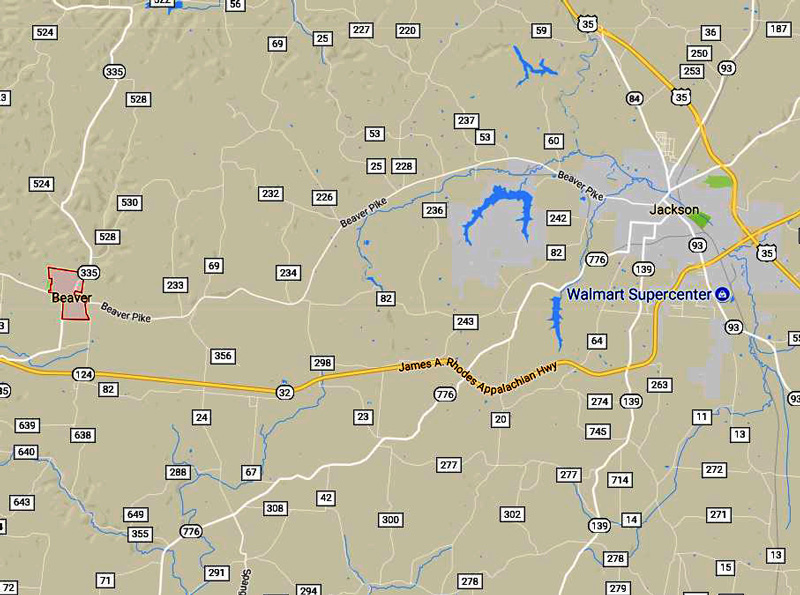
My father was farmin’ then in Ohio. That’s the only thing he ever did the rest of his life. That’s in Jackson County. Just across the line from Pike County‚ though. You know the road turns off to Cove down there. I think it would be about a 160–acre farm. You go down the Beaver Valley down through there‚ a lot of low land‚ but it’s flat. The kind we had back in Kentucky wasn’t that flat. It was up and down.
I didn’t go to high school. I think I was in‚ according to the papers I have here‚ I was in seventh grade. We had a little school‚ and I went from there‚ personally I went in the three C camps for three years. We had a little schooling in there and then we had some when I went in the Marines and that was it.
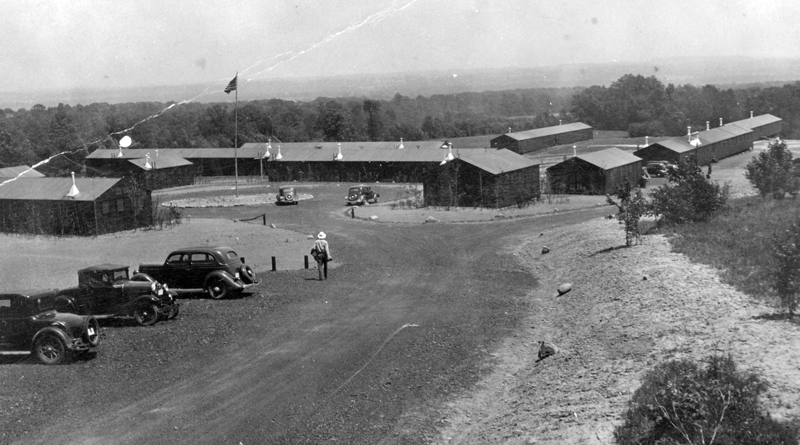
I started off in Jackson over here‚ you know they had a‚ well you probably don’t remember. They had a three C camp over at the county home. From there we went to Brecksville‚ Ohio‚ and from there I went to Bowling Green‚ Illinois‚ and from there I went to Lava Beds‚ California.
Well‚ they just built trails‚ worked on roads‚ set out forests‚ trees. It was a good thing‚ though. I really think it was. We used to get those people out of Cleveland. Those kids were starved. In six months‚ clean ’em up and give ’em something to put on‚ you didn’t recognize ’em. I never seen anything make a change in people like that.
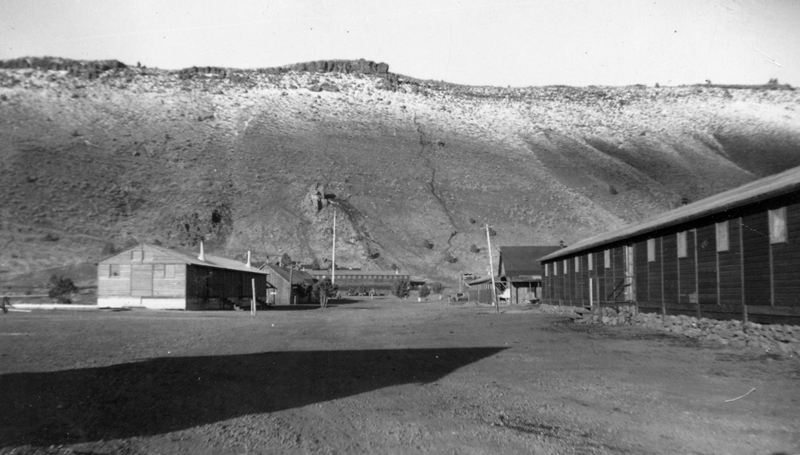
It was a lot like bein’ in the Army. You had a uniform you wore‚ and they took care of all your...you got a dollar a day. The good part about folks at home‚ $25 went back to the family. You had $5‚ cause they supplied everything you needed‚ medical and the whole thing‚ clothing.
Anybody in those days‚ I mean if there was...oh‚ there was probably millions of ’em‚ they was all over the United States. There wasn’t any special...it was just for people that needed help.
I was sixteen. I went in when I was sixteen. I don’t think that what they’ve got now‚ what they call three C’s is anything like that then. I mean you signed up like you do in the Army for so long a time. Then after that if you wanted to stay‚ you stayed on. I think you had to go in for six months or something like that‚ maybe a year‚ I don’t remember. I came out once‚ and I went back‚ cause there just wasn’t anything around. You couldn’t get a job at fifty cents a day. I mean it was the only‚ I have worked for fifty cents a day when I was sixteen. While I was home I worked for fifty cents a day. I imagine it would be hard for you to imagine how it was then.
I joined the Marines when I was twenty–one. When I got out of the three C camps‚ I had a cousin in Miami‚ Florida that had a bakery. I went to Miami‚ Florida and worked in that bakery. What he did is he baked baked goods for the chain of supermarkets. Three years‚ I think it was. From there is when I joined the Marines.
2—Basic Training
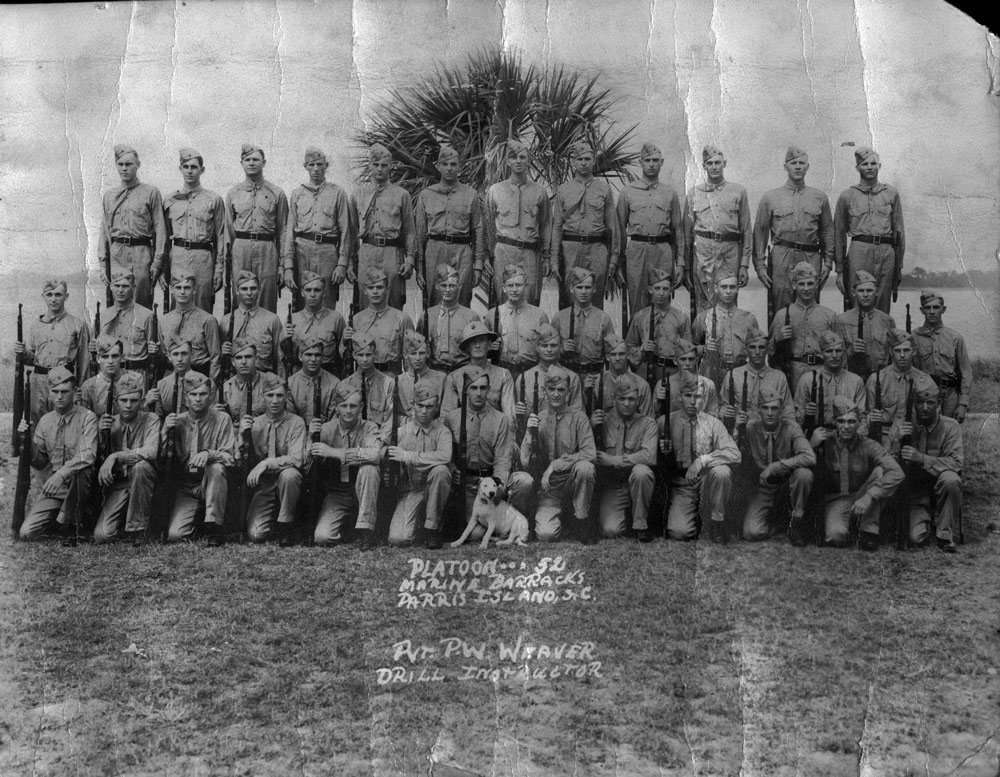
I joined the Marines in Miami, Florida, and went from there to Parris Island, South Carolina. It was June of ’40. We was held over there for six weeks because we got a hurricane in there that slowed everything up, got mud all over the place. If you know where Parris Island is, it’s close enough to the sea that it came in. We must have been there for four months I’d say. We wouldn’t have been there that long if it hadn’t been for the hurricane.
I was twenty–one, and I thought they was gonna kill me. Let’s put it that way. I didn’t know anything could be that tough. They let up when the war started and everybody started comin’ in, they tell me. I don’t know. I was already out and gone. Anybody that volunteered—you asked for it. If you drafted a man you had to allow for that cause he didn’t want to go, probably in most cases.
The Marine Corps drafted men during the war. But that’s the only time that I know of. I don’t reckon they do now.
If you were out on bivouac or out on a combat assignment or training, you might be up all night. And if that sergeant told you to dig a ditch for twenty feet and then when you got it dug tell you to fill it back up, that’s what you did, which didn’t make no sense to me at all. One thing about it, when you come out, you took orders.
They want to break you down and make you like a machine. Now I don’t know whether the Army and the Navy’s that way or not. But that was the roughest thing I’d ever had to handle. But I will say my experience in the three C’s, as far as bein’ in a unit and some of the same regulations, did help me. Cause some of those boys had never had no experience; they couldn’t make a bunk; they didn’t know anything. I fit right in and most instructors couldn’t figure out how, what was goin’ on. You know there’s a right way and a Marine way to do things. You make a bunk, it has to be made the Marine way, not the way you want to make it. Of course that’s the same way we did in the three C camps.
My experience in the Marines was the higher rank, the better I got along with ’em. The drill instructors were bad. I mean they were tough. Their abuse was mostly verbal. There was some physical.
We had guys shot for no reason. I remember one case down at Parris Island, this corporal, he was only a corporal, he came through and told a guy to get outta bed. Of course, it was time to get up you know, reveille. He came back and he just pulled out his gun and shot him. Of course that’s one of those crazy things. The corporal was taken into custody. They marched a bunch of ’em out there in the swamp and drowned a bunch, too. You might have heard about that.
The big thing back then when I was in the Marines is there wasn’t very many...if a sergeant run you up to the captain so to speak, he better be able to whip you, ’cause it was taken out physically. When you came out of the captain’s office, it wouldn’t be unusual to see a black eye. As I say, it loosened up after the Congressmen’s sons and everybody started gettin’ in. That made a great difference. But anyway, it was tough back then. I thought I was tough, but they had me worried down there.
They had a way of doin’ it, I mean they would make you or break you. Now that’s what they were gonna do. We had a gunnery sergeant out on the rifle range, and I mean whether it was an act or not, I don’t know, but you know there’s a position you get to shoot the rifle. When you sit put your feet under you. Some boys which was a little bit stiff couldn’t get down. It wasn’t unusual for him to take a run and go and jump right on top of ’em. Just smash ’em down, throw his old campaign hat on the ground and just stomp it all to pieces. Now whether that was an act or, but they intended to break your...I don’t know whether you’d call it breakin’ your spirit, they was goin’ to make a machine out of you, so when you pulled the trigger it would work.
I was pretty well disciplined when I got out of training. I had sense enough to put my head down when a bullet was comin’, but I think that was the idea of the thing. There was so much fear in it, you didn’t dare not obey. And there wasn’t no gettin’ a lawyer or somethin’ and gettin’ out of it. There was nobody to back you up. Now whether it made that much difference in the troops, I don’t know. Whether it turned out better, of course they’d speeded the thing up because they needed ’em so bad that they couldn’t afford to train ’em that long.
I joined the Marine Corps because I suppose the name it’s still got, the toughest outfit there is. Elite, so to speak. And they used ’em that way out in the Pacific. I don’t know whether any of the soldiers ever went in first or not. They might have. I don’t know. The Marines went in and took it, and then here come the soldiers.
To be frank, I went into the military because it was the handwriting was on the wall at that time. We were goin’ to war. And you had a choice if you went in early as to, I mean what branch you wanted. It’s my understanding during the war that you didn’t have that choice. Wherever they needed you is wherever you went. I think that’s the way it happened. I was gonna have to go anyhow, so I was gonna get it over with, get in there in the outfit that I wanted to be in.
I reckon I wanted to be a Marine. Well, you know, they’ve glamorized them now. They’re, frankly they’re not any tougher than a soldier or sailor or anybody else. At that time I believe we had more training, more difficult training, I mean.
We had the whole works. You acted out everything you were going to come up against. Of course you had to go to the rifle range to qualify that you could shoot the target and hit it right, with a rifle, with a .45 automatic. And you’d bayonet practice and all that stuff. We covered every gun except the, the big guns. In my outfit we didn’t have no big guns. We did on board ship. I had to go to Sea School before I could go aboard ship.
We didn’t have any blacks at all at that time, and as you say we’ll get to it later, but they was segregated on board ships. They had their own bunks.
There were no women in my training outfit. I think they came along after the war started. Well, you had nurses, yeah.
Emergency leave was always available, for death or anything like that, but other than that, why you had starboard and port in the Marines and that’s the same thing on a ship. They got a leave one time on starboard, and port got leave the next time. We didn’t all go out at once. You see what I mean. Cut down the middle.
Now when we were at Basic Training, I don’t remember ever gettin’ a leave in the months we were there, unless it would have been emergency leave which I didn’t take. No, you didn’t get any leave while you was, well we called it boot camp. There wasn’t any leave there. Then after that.
All the drill instructors carried sabers. I don’t know what they do now. And he could be a corporal and have a saber, and the first, second day I was there, still in civilian clothes, hadn’t got my issue. As I remember I had these sharp pointed shoes on. I was out of step. He just took that thing and then tripped me and I fell right on my face. You talk about bein’ mad, I was mad. I got up, he said, “That makes you mad, don’t it?” I said, “Yes Sir.” He said, “One of these days we’ll get mad together.” I says, “Yes, Sir.” I mean you know it takes all your dignity away from you to say “Yes, Sir” to a PFC or a corporal, you know what I mean. But that’s the way it was set up. They were officers as far as we were concerned, no matter how low–ranked they were.
If we were goin’ to chow and of course down there at Parris Island they had barracks that’s three decks high, and they give you so many minutes to get out front to line up. You marched to everything. In order to get to go to chow, he’d call it and maybe we’d have to take four or five runs at it before we got out quick enough to suit him. And he was talkin’ about get irritated. Now that’s, as I say, the whole thing was to break you down and make a machine out of you.
Now if you was put up for extra duty they give you a toothbrush and go in there and scrub the head, which was a bathroom, a toilet. A toothbrush to scrub the floor of a head. So that’s gettin’ you down there.
It seemed to work. When that unit came outta there it worked like clockwork. I mean everybody was in their position, and it probably did help some in the long run.
4—Carrier Duty
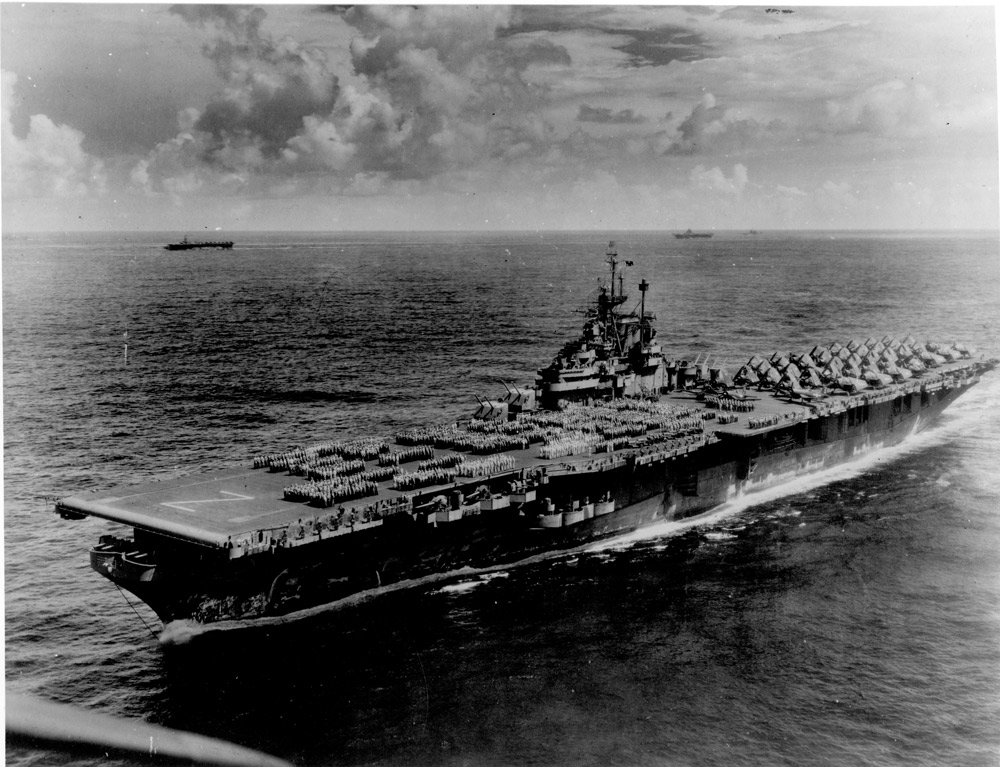
After Sea School we went aboard ship, the USS Shangri–La, an aircraft carrier carrying one hundred four aircraft. There were one hundred four Marines aboard also. I got on the ship on September 15, 1944. The first thing we did, we went on what they call a shakedown cruise. That was a brand–new ship when I went on it. We was the first ones ever aboard it. It was just a kind of a different world bein’ aboard ship all the time. It was a thousand foot long, but you had three thousand men on there. We went down to Panama on a shakedown cruise to try the ship out. To see that everything worked. We got off from Cape Hatteras as we went down through the east coast and we buckled a beam in the center, in the ship. Now, we went on to Panama and I think we got a little shore leave while we were down there, but all this time they were flying planes off and on and training the pilots. We lost one pilot down there off of Cape Hatteras. He went off and I thought the whole Navy would stop and look for him, but it was like he never went off. He went into the drink. Now we had some destroyers with us. Whether they picked him up, I never did know whether we found him or not. We had three thousand crew. All together. And that makes it pretty tight, too.
Our aircraft were the Corsair and a Helldiver and a torpedo bomber. The Corsair was a fighter plane, only one man in it. Torpedo bomber, it had a gunner and, maybe that ain’t the proper name, the dive bomber for the other one. They dropped bigger bombs. The fighter planes were strictly to protect the others, although they did strafe some. You know, the installations on shore or anywhere they’d see, a ship or anything else.
The flight deck was a thousand feet long. I never could understand when they were up at night how they could ever hit that flight deck when they came back down. Of course, you’d flash those lights up, but you got the island sticking out there in that thing, what we called the island where the captain of the ship controls it from. The bridge. How you could ever land that sucker after dark, I don’t know.
You know they’re gonna take off. They catapulted a lot of them off. We had a couple of Marine pilots on there and they had them loaded one time. They were loaded too heavy. We lost both of them. Now whether they had too much gas with ’em...they used to carry those tanks, you know. You had extra gas, belly tanks. When they went out they just dropped ’em to get rid of some of the weight. I suppose they used them first and then they used what was in the plane next. Some of them had those, well, what’s the name of ’em now, where they drop ’em and they explode? They burn up everything. Napalm.
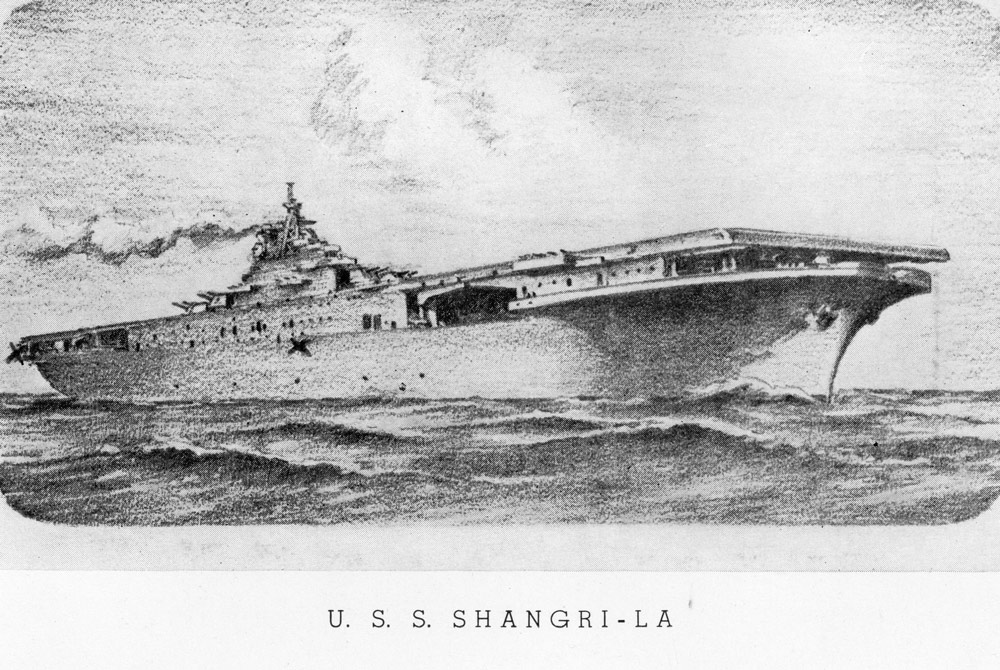
We lived on the midships, right under the bridge. We had our own compartment, the Marines did. We had one compartment that held us all. The officers had their own quarters. Two lieutenants, one captain. Other than that we were all in the same. We had a hammock that’s made up of canvas and rope and they’re stacked up. Three high, I think. There’s somebody on duty all the time, so we did not usually have three men sleeping at one time. We had enough room so we did not have to share the hammock with another shift. Each man had his own hammock and his own built–in locker.
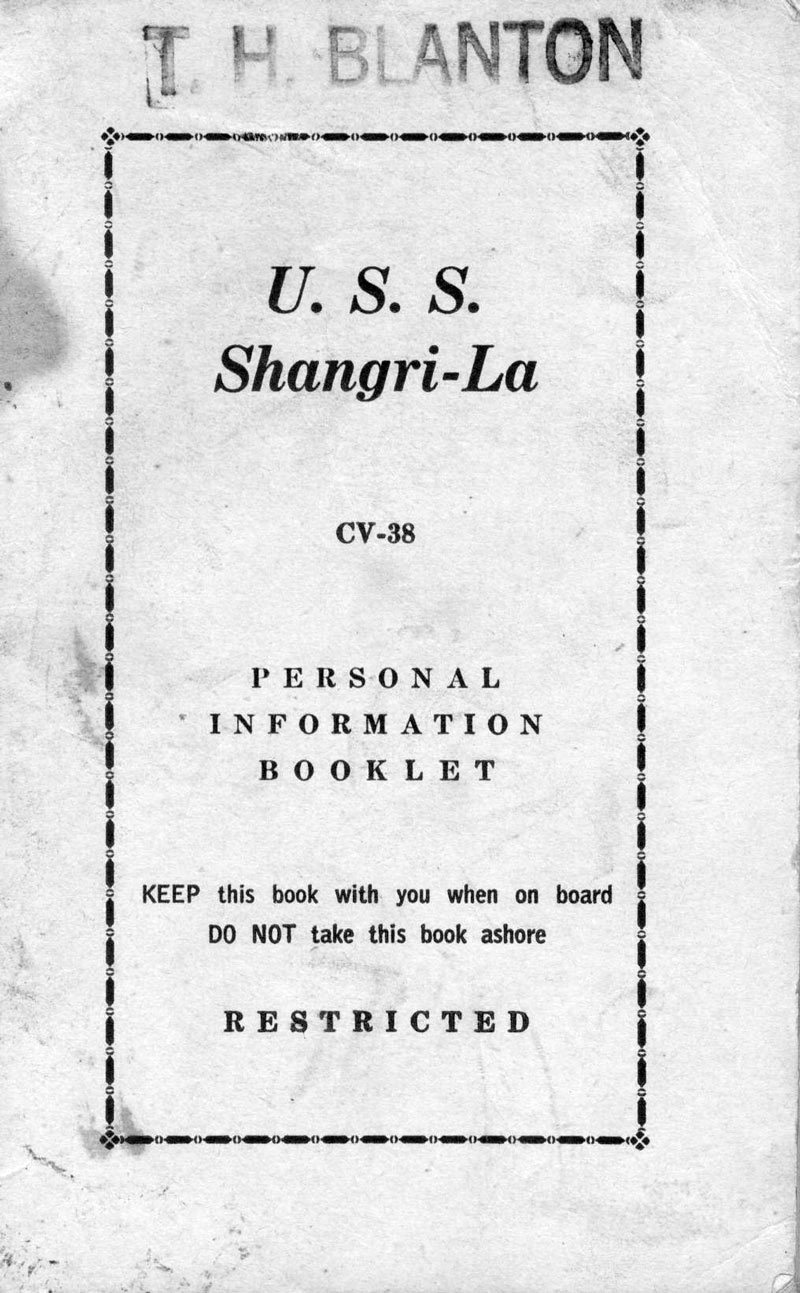
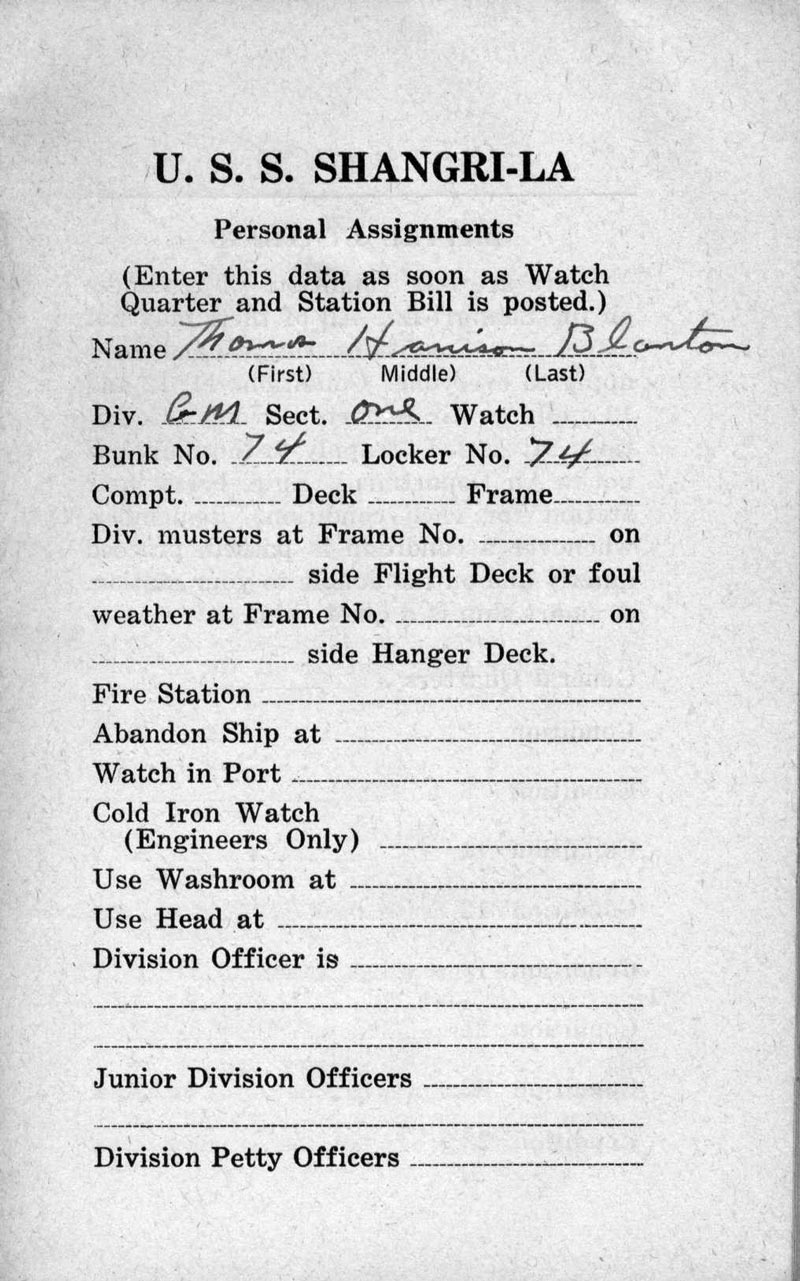
You could carry something to eat with you and you had a place to sleep. When you are out in the mud Marines, in the infantry, you didn’t have none of that.
As a rule we had good chow. We run out of fresh fruits, milk, used a lot of powdered milk. We were out ninety days one time without any supplies to amount to anything. Of course we refueled at sea and we took on supplies at sea. They just come along side and tossed it over. You had several places to feed the men on a ship. It was certain times, you know. We didn’t have meat all the time, but we had a pretty well balanced diet as a rule. Sometimes the water got low and you didn’t have fresh water cause they couldn’t make enough. You had to use sea water. Sometimes you took a bath in salt water. We didn’t have too much steak if that’s what you’re talkin’ about. When I got back to the west coast that’s the first thing I ate—a steak about that thick. It was a lot of powdered milk and powdered some kind of potatoes that’s you know, what do they call ’em, instant potatoes? Stuff like that. Sometimes we run completely out. I remember three months out there that we didn’t get hardly anything, and we were gettin’ awful low on food and stuff. But you always have C rations. You always had enough of those.
The Franklin got hit in our task force. They got fifteen hundred men on it at one shot. They was in line to go to chow. After the Franklin got hit and all those people got killed it made an awful twist in the eating deal. The only time you really would line up at all would be after dark. No more daytime chow line. You got hot meals after dark and you ate K rations the rest of the time, or C rations. But they did change the carrier so that bombs didn’t go down in the magazine. That’s what happened to that carrier. A bomb hit just right to go down the elevator, got in the magazine and blew the whole thing up. That bomb went down. After that they started zigzagging the elevator where the bombs come up from the magazine.
The big danger on a carrier is fire because the gasoline...you know where you carry gasoline on a carrier? All the way around it. On the outside shelf, which it seems crazy to me, but I guess they have to carry it somewhere. When you get that on fire, then, with all the gasoline in those days, I think that fire mighta burnt, of course there’s no doubt a lot of ’em was killed with explosion, but fire mighta done more damage than the explosion, probably. They were just completely burnt up. After the Franklin got back to Pearl Harbor, I guess they found some men that they didn’t even know was in there.
I know one thing. That was the awfullest odor I ever smelled. They took, what they did with those guys, they, now I didn’t see it happen. I wasn’t close enough to see it happen, but they said they just took shovels and threw ’em overboard.
They got the Franklin back to Pearl Harbor, but it looked like a honeycomb. The Franklin was the same size as our ship. It was in the same task force. We were in the Third Fleet. Task Force 38 is the one we were in. I think it’s a sister ship, to tell you the truth. I know it got back. They mighta towed it, but it got back.
Back to the shakedown cruise. We went down to Panama. We brought the ship back to Norfolk to fix it. The only thing we did mostly was just drills of general quarters, run to your guns. Go to your battle stations. That’s what it is, general quarters. We had a lot of that and we done target practice and they took those planes and put a target behind ’em, which I never could figure out.
I know some of those pilots really got worried because they wasn’t that far ahead of that target they were pulling. There has been some of ’em shot. You could hear ’em on the radio and they’d say, “Hey, you’re gettin’ too close!” The target’s way back there, I don’t know how many hundred feet or hundred yards or whatever it is, but that’s what you shot at, was that target. He was pullin’ it right over top of you.
We were able to hit the target with the guns we were shooting. Of course it’s very unusual to knock one down, because it just goes right through ’em. I think they’ve got a hoop on ’em that pulls ’em through just like a kite a flyin’ or something like a long tail up there. That’s what you practiced on all the time. The pilots got more of a workout than we did really on the shakedown cruise. Comin’ aboard and landin’ and takin’ off and so on. Training flights.
We had an escort, but not a heavy escort. We might have had a couple destroyers with us, cause those submarines was operatin’ everywhere. The German submarines were. We had a few scares. They must have had some way of detectin’ whether a submarine was in the area or not. That’s where the destroyers came in, with all those tin cans they could dump on him, find out what his position was, cause a carrier ain’t no good for one of those unless he surfaces and you can shoot at him or bomb him with one of the planes. I mean a destroyer done most of the damage on the submarines cause they carry those explosives. They could set ’em at any depth they want to set ’em and go down and get him.
We returned to Norfolk and got the ship fixed and then we went down through the Panama Canal and went to the West Coast on out to the Pacific. We had to take the guns off the side to get through the Panama Canal. It wasn’t wide enough. There’s some gun mounts on the side. They had to lift them off and then reattach ’em after we go through. It still saved time from goin’ around South America. Without the Panama Canal we’re in trouble gettin’ to the West Coast. I’m like you. I thought that’s crazy you have a Panama Canal you can’t take a carrier through, but that’s what happened. The Shangri–La was one of the biggest carriers then.
From there we went to, now we did go to Pearl Harbor. We stopped off at San Francisco to take on supplies. At Pearl, I know there was a pineapple factory out there where you got to drink all the pineapple juice you wanted for nothin’, free. I didn’t think that much of Pearl Harbor in those days. I don’t know what it looks like now, Hawaii.
At the Dole factory they said that any of the servicemen wanted to go out there and they’d give ’em all they wanted to drink. A bunch of us boys went out there. We wasn’t there very long as I remember. I suppose we picked up supplies there. It seemed to me like we took some officers or troops with us out there. Not too many, not like we brought back. We brought back all we could stack on that thing when we came back. But I believe we transferred some Naval officers or something. I don’t remember anymore.
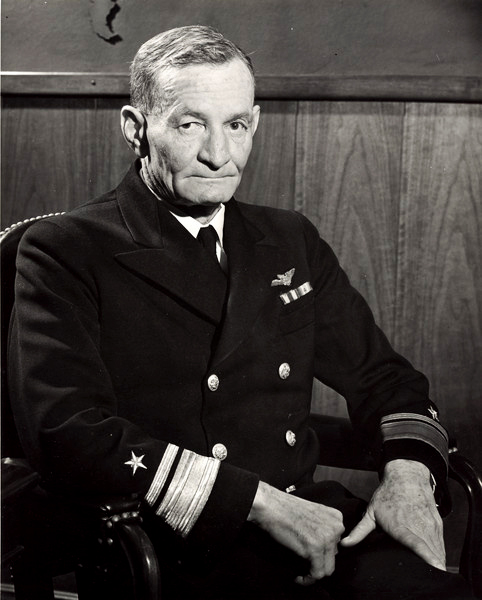
Admiral McCain, he was on, we had the flagship for a while. That Bull Durham is what killed him. You could track him all over the ship with his, rollin’ them, he smoked Bull Durham. You know those bags, you know what I’m talkin’ about?
I think the fleet was in operation that we went into. We was addition or replacement, one or the other, because I don’t remember leavin’ Pearl Harbor with a lot of ships. We were in the Third Fleet. Now the Third Fleet had different groups of ships. We had carriers, battleships, cruisers and destroyers. Now how many there would have been of each one I don’t know.
Admiral McCain was the commanding admiral. He died a day or two after the war was over. Admiral Nimitz was the big wheel of all of ’em in the Pacific Fleet. Yeah, that’s right, and then they had these other groups where they had an admiral in charge of each group. I guess ours was number 38 and it was a part of the Third Fleet.
We had three other carriers at least or maybe we had five altogether in our group. When you was on a carrier, about any direction you would look, you could see some kind of a destroyer or a cruiser or a battleship. Now, I don’t remember, I don’t recall, not over two battleships anyhow, with us. That’s the ones that shoots the 16–inch guns.
Now if you were gonna have an invasion goin’ you had to have the planes there. You had to have the battleships and the landing craft and the whole works. You need a little of all of it in order to go ashore. The battleships. Miles off would bombard the place before and then the planes would go in and bomb it before the troops ever went ashore. They’d soften it up a little bit.
You had to have the carriers there because those Jap planes were all over the place. You was constantly battling them, the fighters were, tryin’ to knock them out of the air. Cause you couldn’t do nothing, you couldn’t get ’em landed, you couldn’t get a craft aboard if they was up there bombing you all the time or strafing you. So you had to have that.
We were right up along the coast of Japan, pretty well in, and then around Okinawa. We hit Okinawa quite a bit one time. I know this. We’d go south and hit a while, go up north. You’d freeze to death up north and burn up down south. That’s how much difference there was in temperature.
I found out after I was out there a while, you don’t measure distance in miles. You measure it in days on a carrier. You don’t even think of it in miles. You think of it in days. I came back to the States, took us seventeen days to get back and couldn’t figure that out. They showed a chart on there, I don’t know whether I’ve got a picture of it now, how I thought when you come back you come straight. It looked like we went the way of China on that map. Well, you can’t go straight. That’s one thing that’s always puzzled me.
We were supporting the Okinawa landings, because our planes went up every day, bombing. I don’t mean one time, they just kept goin’ up. I remember losin’ fifteen planes in one day. The biggest reason we lost the fifteen that I know about. I don’t know how many got shot down, but they was so far away when we had to move. Japs were after us so that we had to move, and we got too far away from ’em and they run outta gas. So they came back and they were droppin’ in the drink like shootin’ ducks.
5—Combat at Sea
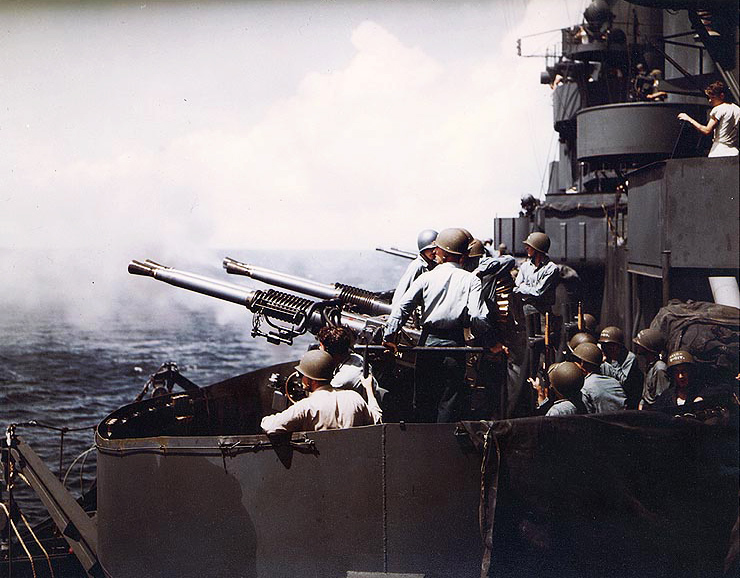
My gun position was under the fantail. That’s what we call it. That’s the rear end of a ship. It was between the hangar deck and the flight deck. We had two. They called ’em quad mounts, four barrels, one underneath the other one, up over the top of each other. Like upstairs, downstairs. There was eight altogether. Four down, and they were right up over each other. There was a lot of room between the hangar deck and the flight deck. There was room for two guns in there.
Of course I was up next to the flight deck, my position was. When the planes came in it felt like they were about three foot over my head. When the planes landed. You had steel around the mount, maybe up three foot high, more or less to protect you for when you swing the guns so the loaders wouldn’t fall off or anything like that. As far as any protection from the air there wasn’t any.
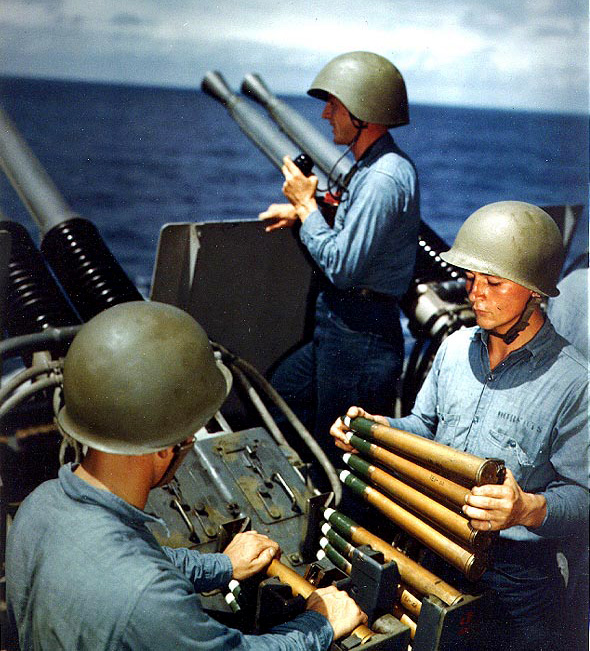
I aimed the gun. They called ’em Mark 14 sights. You put it on target, put the crosshairs on target and it computes its own lead angle, elevation. You hold it on target, and I suppose it has a computer setup of some kind in it. My job was to control the gun, to hold the crosshairs on the target, and I had the trigger to fire.
There were four barrels. They didn’t fire exactly together. It’s the way you fed it. You had control of all four barrels. I used to know how many rounds per minute, but I can’t tell you now. The ammunition came in a clip about a foot and a half high. Seven or eight rounds in there, and you just have to keep feeding ’em. That’s how fast they fire. They go right down into the barrel. We had a loader for each barrel.
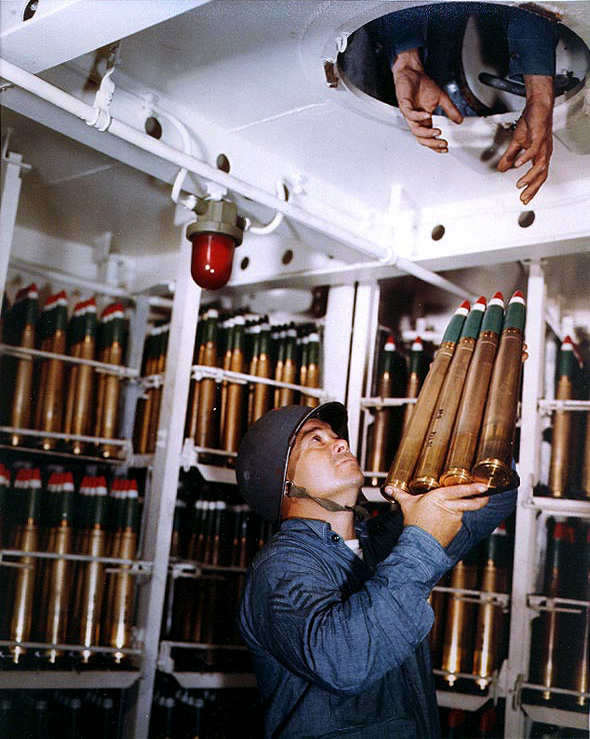
You always had people to bring the ammo up to them. They were all shipped in a can, a square can. They’d fit in there. The clips fit in the can. They’d make preparations when we were under attack to get ’em out, get ’em ready to pass up. In other words “Pass the Ammunition” up to the loaders. The loaders dropped ’em in. All the members of my gun crew were Marines. Other gun positions had sailors.
I would probably think that that was the best anti–aircraft gun they had aboard except the five inch. Of course you don’t shoot a five inch close. You try shootin’ with it when you’re on the radar. But after they come in, I mean the farther out the better off you are with the five inch. The five inch could pick ’em up first and had a longer range. Then the forty millimeter would come in and twenty millimeter when they get in close enough. I was on the forty millimeter.
Under heavy attack we were all firin’. I mean we were just layin’ down the barrage, tryin’ to keep enough up there so nothin’ could get through.
I had a lieutenant. He had the quad mount underneath me. He had charge of it and I had charge of this one. There wasn’t enough officers to go around each gun. I was a platoon sergeant.
Our aircraft carrier left Pearl Harbor and joined the fleet somewhere out in the ocean. We did have escorts to take us out to the fleet. Destroyers mostly. It seemed to me like we might have had one of the baby carriers. You know, they had carriers that carried about forty planes. Small carriers. I don’t even remember the name they gave ’em. But they were out there, too. It took a matter of days to join the fleet, but I don’t know how many days. We were out there probably in a week.
The fleet was off Okinawa. That’s where the battle was goin’ on. We were takin’ Okinawa then. We were supporters for the troops on shore. I don’t know whether they were just goin’ in then or was already there. I don’t know. We were either supporting troops ashore or supporting what was gonna be troops ashore. Well, we carried on through whatever it was.
I’d say it was maybe a month or so before we really got into a heavy attack, but you always had these single planes comin’ in. I mean like suicide planes, and they would just come in at random. You never knew where one was gonna be. Of course you’d pick ’em up on the radar, and you’d try to knock ’em down. Kamikazes. If they hit in the daytime they usually get up as high as they can, right in line with the sun, and come down at you.
They came one at a time when you wasn’t under a heavy attack. They always had some guys out there watching you, or tryin’ to get you. When you have four suicide planes hit the one landing craft that gets the people to take ’em ashore, you know there’s a lot out there. There was sometimes hundreds out there.
We was always goin’ to battle stations. I mean if they picked up anything on the radar. It would be a daily occurrence while you was out there. When they sound general quarters which would put you on alert, then you go to your battle stations, and you stay there till they call it off. Grab your hard hat and go. Everybody knows where to go. My job was to have my gun ready to shoot immediately, if not sooner.
They usually give you the direction, where they expect or where the bogie was. We always wore headphones. That was connected to the bridge, and they were passin’ on all the information. When it came time to fire the original orders came from the bridge. And then everybody let go where, sometimes maybe if they were comin’ around the fantail you’d fire on the fantail and you wouldn’t fire up on the port. And if they said fire at will, you just kept firing. It would always depend on the orders from the bridge.
The enemy planes’ prime target was the carriers because they were a much bigger target. If they could knock the carriers out, they could get rid of the fighter planes. Then if you can knock all the carriers out we wouldn’t have any protection, until they got right over you.
It’s like Midway. They went after the carriers. So they would all go for the big plum so to speak, like we did. We’d rather knock out a battleship than a destroyer. We get rid of him he was a bigger prize for us to knock out.
I think most of the time the kamikazes attacked. I doubt if the Japs had too much goin’ for ’em except kamikazes when they were on the attack. They did the job. When you got under a full scale attack, why you had all kinds of bombers and torpedo bombers. But it seemed like they picked on a time when you didn’t expect ’em, and they would just come outta nowhere. Gangs of ’em. I don’t believe that suicide planes was mixed in too much with the regular attack planes. Just like a different organization. It seemed to me that way.
I don’t remember ever trackin’ more than four or five planes at a time. But then I was only lookin’ over one area. And if the whole fleet was under attack, there coulda been a hundred, maybe two hundred. I had my job to do. There was no way I could shoot forward of the ship. Cause the gun only swung, well it’d swing to the right complete and swing to the left complete and that’s as far as you can go. Pointing aft. The gun would elevate almost straight up, as I remember. Then it would come down to where you could get...some of those suicide planes wanted to come in right over the water. If they came in over the water they could avoid radar. Radar wouldn’t pick ’em up. That’s where a lot of torpedo bombers wanted to get in. They’d just skim the water and be on you before you knew it.
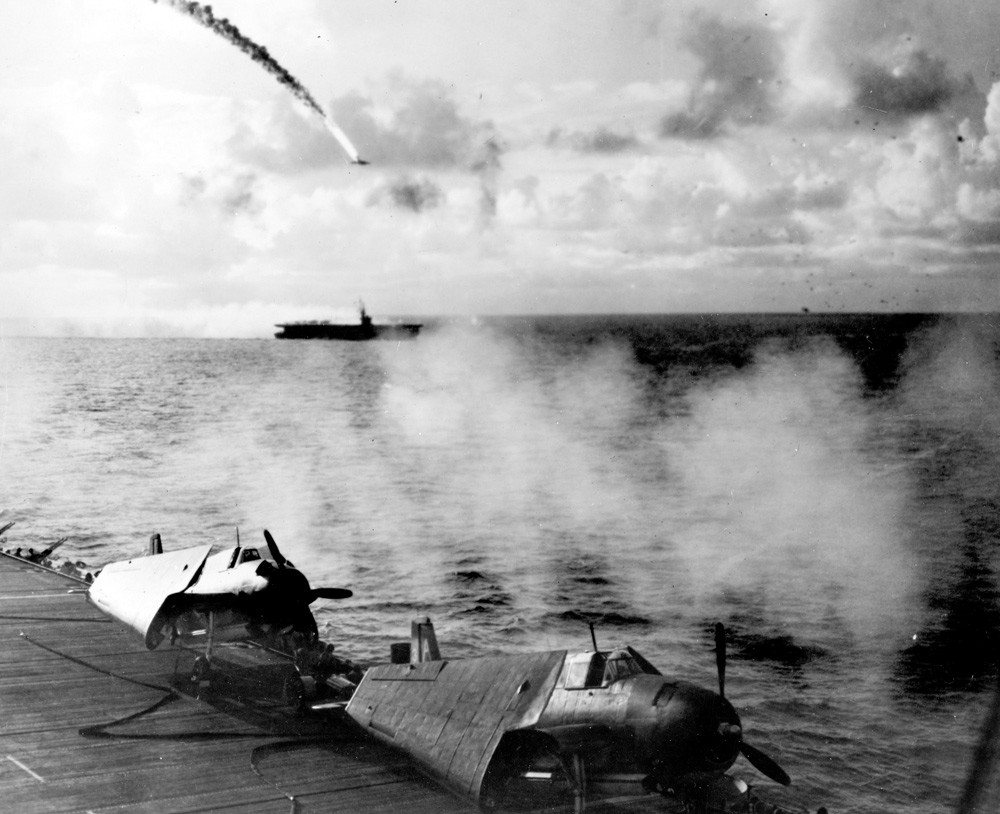
What did it feel like when you’re under attack? It would have been nice to be back in Washington. You feel fear. Some of those boys with all their rough talk and everything, you could hear a pin drop when we’re under attack until a gun started firing. It was serious business. You didn’t know whether that was gonna be the end. For a lot of ’em it was. It got serious in those times. You might joke and go on other times, but there wasn’t much jokin’ goin’ on at that time.
When the guns started going off, you didn’t have time to get worried about it then. I think you got scared more after the attack was over, thinkin’ of what could have happened. I suppose you’re in kind of a shock at that point. I don’t know. But you’ve been trained to work like a machine anyway. The objective was just to work like a machine so it didn’t bother you. I mean at that time. You still had control of your senses and do what you could do. That’s my experience with it.
You usually froze up afterwards. I never did freeze on the job. We have had ’em freeze. We had some black boys on there and we was under attack one day and they was tryin’ to get ’em to quit firin’ and they was burnin’ those 20 millimeters up. They just hung on, they had to pull ’em out of ’em almost. I guess they were just kinda froze. The black boys handled a lot of the 20 millimeters.
The only damage the Shangri–La got, real damage, was from our own planes. When a plane would come in and crash on landing. We’d try to drop a lot of bombs they couldn’t release, and when they’d hit the decks the bombs come off. But they never exploded. That’s what we was always in fear of. There’s somethin’ wrong they couldn’t get rid of the bombs. They’d a dropped ’em in the ocean if they could have. But they couldn’t get rid of ’em. They had to land with the bombs on there and nine times out of ten the bombs would hit the deck when they landed and come scamperin’ down the deck. But we never did have one to explode.
Of course on those carriers when those planes come in, if you miss all the hooks you got a crash barrier set up there, see. The plane lands right into those big cables, and they’ve all got springs on ’em. But the idea is to hook the plane. It carries a hook on it, you’ve probably seen ’em. You have to get ahold of that hook and then the plane will come back at you. But the crash barrier is the last chance. If you don’t hit it, you’re goin’ on off the other side.
Well, we always got replacement airplanes. Almost every day or almost, sometimes two and three every day. If we’d lose any they were replaced. Now where they came from I can’t say. Whether they flew ’em in or, they might have had a carrier that was bringin’ planes into the area and then they’d fly off and come aboard. Now, I think the worst day we ever had was we lost fifteen planes.
You wouldn’t put all your planes up at one time. I think we’ve had at least half of ’em up a lot of times. About fifty planes. I know one day we lost fifteen, and we didn’t lose all the pilots because the big reason we lost several of those was they was too far away. They couldn’t all get aboard. So they just ditched the plane and they didn’t bail out, but those planes don’t sink immediately. They had destroyers picking the pilots up.
The destroyers would usually pick ’em up. They were the smallest ships we had. Some of the pilots didn’t get picked up for a while. They had to stay afloat. Of course they all had life jackets on.
I was there when the Franklin got hit and we lost fifteen hundred men on it at one shot. The whole fleet was under attack. Now I know there was other ships got hit. I wasn’t watchin’ the Franklin at that time. I was tryin’ to protect myself. But afterwards is when we found out. Of course those carriers are not close enough that you can holler over there, you know what I mean. They’re a long ways off. The first thing, you know, there’s a lot of smoke.
The Franklin was the same size carrier as the Shangri-la. Sister carrier. I didn’t see it myself. I didn’t see ’em shove all those boys over the side or anything like that because I wasn’t close enough to see it. The only thing I remember is the awful odor. It smelled like flesh burning.
As far as disposing of the bodies, well, I didn’t see it. I wasn’t close enough to see it, but that’s what they said they did. They took those scoop shovels and of course a lot of ’em were burnt to a crisp, I guess. And they just...that’s no worse than what we did, though. I mean when we got gunners killed we buried ’em at sea. There was no way I don’t imagine you could identify very many of ’em. Under a situation like that, I don’t know. I never seen it. I’m glad I didn’t see it, close.
Most of the damage was caused by fire. The deaths were caused by fire. See, you’ve got gasoline all over that place. After the battle is over they give a damage report of what all has happened. How many ships was knocked out and so on and so forth. I can’t remember what else was hit.
One five hundred pound bomb, they said, did the damage. It went down the elevator shaft, went down in the magazine. They store their torpedoes and their heavy bombs and everything in the lower part of the ship, down below. This elevator shaft at that time was like gettin’ on a hotel elevator and goin’ straight down. And after all that happened, why they switched it some way. They started makin’ all the other ships where the magazine elevators were offset. Because when that bomb would explode in the magazine, that’s where all the ammunition was stored. It just tore up everything.
I’d say there were three thousand men on the Franklin. It was a sneak attack. Evidently they didn’t know it was comin’ on or they would all have been at general quarters. The elevator was in the center of the ship there, but the fire killed more men than anything else. They just burnt up. I guess it was honeycombed in there. I mean it just blowed the sides out in there.
They thought they was gonna lose it. They’ve got a lot of ways of balancing with water to hold them suckers. You have the front end out of one of ’em and balance ’em enough with water and, to keep it goin’. I know when they put the Shangri-la in the water and we was on it, we just set down out of dry dock, it was almost at a 45 degree angle. It took ’em several hours to balance it. I guess you can’t build one without it bein’ heavier in one place than it is in the other one. You get it balanced and they use the gasoline around the side to help on the balance some.
I never could figure out why they carried gasoline all the way around that sucker’s shell. I mean if you’re gonna get hit anywhere you’re gonna get a fire. Of course if you had it all in one place, maybe they’ve got separate compartments.
You could see the Franklin. I mean the smoke. And the wind had to be set right. You could see an awful long ways out there. Maybe a mile. They had smaller ships to give assistance. You can’t maneuver one of those carriers into a position like that.
You can’t take a carrier into a lot of ports, too big. They leave ’em anchored out. Of course we’d refuel and took on supplies at sea. That refueling was not a big deal. It’s just big lines that they pass over from a tanker.
This battle was somethin’ like after we left Pearl it was probably in the neighborhood of a month or five weeks. After that battle, we were under attack several times. But I wouldn’t doubt if that one didn’t do more damage to our fleet than any other battles that we were in.
Then on the latter part of the war which I’m talkin’ about, the suicide planes got thicker and thicker. I mean they just...they couldn’t do it one way they were gonna do it another way. I mean knock out those carriers and the big ships.
We had two ships hit there one day. Came right straight down for ’em and hit ’em. I don’t think he sunk ’em, as I remember. It looked like it had been shot down and hit the ship, you know. That’s what it looked like. But they always told us they set those suckers when they get ’em pointed where they want ’em to go, they set ’em and if they get killed...you can kill the pilot and they still come in on you. I don’t know if that’s true or not. In other words, if you didn’t explode ’em in the air you got hit. That’s one thing I didn’t believe till I saw it with my own eyes.
I didn’t think it was possible for anybody to do that. I guess we had a lot of men do that, but they didn’t intend it to be that way, you know. There were certain situations where it was almost a suicide mission, and it was, to accomplish some goal so there’d be some information back to headquarters, I guess.
I don’t remember hitting an enemy plane. I don’t think you knew who hit it. As I say, when you look up there, if you ever seen a...well, I never seen that many stars in the sky, as many shells was explodin’ in the air as there was in that. If you take forty or fifty ships with all the guns they got puttin’ anti–aircraft up. The idea was to try to hit it, sure. You know everybody tried to hit it, but who hit it and how many hit it you don’t know. The idea was to put enough up there somebody was gonna get him.
As far as just goin’ at it like target practice and pickin’ you out a plane to shoot, it would be hard to do because everybody else was shootin’ at him, too. But we knocked down a lot of planes. Who done it, and I don’t think they give anybody the credit for any particular amount of planes. It was just a fleet deal where the overall report came out there was so many planes shot down.
There’s no doubt the anti–aircraft fire was effective. Without the anti–aircraft guns...we had fighters up there, but your fighters couldn’t come in there close. They’d try to stop ’em before they got in that close. But if they were in there they gonna get shot, too. We were shootin’ one night with a five–inch gun. We were shootin’ at our own pilot, and he was raisin’ all kinds of Cain.
Evidently he hadn’t identified himself right or somebody had fouled up. We lost a lot of men through just plain ignorance. There’s no doubt about that, but in an operation like that you couldn’t...we shot some of our own planes down, but I doubt if it could be helped in a big operation like that. And they don’t take chances. If it’s enemy air foe or friendly or whatever. If one’s comin’ in he better identify himself and he better not be too close to the other one. Our fighter planes were out there, but they’d be in the same predicament the Zeros would be if they were in close. There wouldn’t be no way you could shoot around ’em.
We had training to identify what American planes and what enemy planes looked like. I don’t know whether I can remember now maybe any of ’em or not. But I know that big red ball they had on the side of ’em was Jap planes. The rising sun. The closest I saw an enemy plane was some shot down and come in the drink probably. I’m just guessin’, maybe a hundred yards.
I don’t remember ever seein’ a pilot in the cockpit. Whether I was lookin’ for him or I was so excited I had my mind on somethin’ else. You could see the plane, it was big enough you could see. I wasn’t about to take time out to see what he looked like.
I think we had more attacks in daytime. We were under attack a lot more in the daytime. That’s when they wanted to sneak in on you, at night. You know what I mean. Same way with your submarines. You had submarines to worry about, too.
We operated well out to sea. We were well out. I think it was ninety days I didn’t see land. But the sailor or Marine’s gotta be out there, and he’s gotta be out in the middle of the fleet, too. There has to be room for somebody to surround him, between you and land. You don’t dare get too close. They’ll pick you off from shore. Some of those guns, the big guns will go out there for miles. I don’t know what that sixteen inch gun, it seemed to me like it will shoot about twenty miles. No, as I remember, there was very little land we seen any time after we left Pearl Harbor. After the war was over we got in close enough that, you still can’t take a carrier in very close.
Now what we did off the coast of Japan afterward. We moved the carrier around. You never let a carrier set. Well, the whole fleet didn’t set. It moved. It was on the move all the time because you couldn’t hang around one area. They locate you and then that’s it. But we’d go up north of Japan and south of Japan, back and forth, back and forth. The planes would strafe the shorelines or support the troops.
What was going through your mind? You go through that period, maybe you’re goin’ home and maybe you aren’t. I mean you know we all had that feelin’, I reckon. Cause it only took one time.
6—Occupation duty
Whether we ever had any planes that attacked the mainland of Japan I don’t know, cause they didn’t tell us everything where they were goin’. We were close enough, you know, in the end. Cause it didn’t take us long when they took us all off the carriers to go. Well, they was a couple days groupin’ us up. Gettin’ us on this landing craft to go ashore.
When I went aboard that ship out at Pearl I wasn’t off till the war was over, except when I went over there, landed in Yokosuka. That’s a naval base. Japan. We went in there for occupation. That’s what we went in there for. And when the occupation was over and everything was settled, why we got back. They brought us all back to one of the carriers and it was all over and we started home.
We thought the Japanese had quit fighting, but there were still some of ’em around. We never captured any of ’em. But they went off, took off to the hills or somewhere, and the only thing I saw was a few children and old men. Where the soldiers were I don’t know.
It was immediately after the war was over. I mean it was supposed to have been over. Now the last day after the war was supposed to have been over we had as heavy an attack as we ever had, with suicide planes. They sent ’em all out then, even though the war was supposed to be over. We got more damage after the war was supposed to be over than we did for a long time before that. I suppose it’s...those Japanese people were funny people. If you die for your country you’re going’ to heaven.
And they sent ’em all out then. I remember after the war, we didn’t expect any more planes. We thought the thing was all over. Let’s see. We was in Japan now.
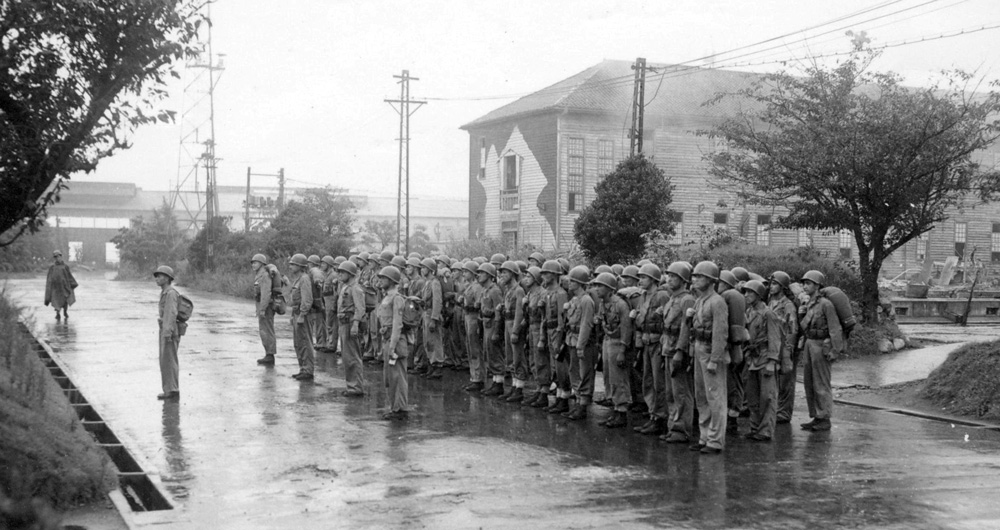
We took over the Yokosuka naval base. It was a naval base is what it was. Mostly guard duty, to secure it. I’ve never been able to figure out what good we did except I didn’t see too much of the enemy around. There was some firin’ goin’ on in the hills and stuff, but I never seen any of ’em. It looked to me like it was deserted. They left the place clean. The mess halls and everything was as clean as a pin.
Except the only thing they left to eat was fish heads, pickled fish heads. They said they sold the fish and kept the other, but it was clean. The mess hall was as clean as a pin.
I don’t know what happened to the Japanese. They just wasn’t there. I don’t know who had charge. I don’t think our captain had charge of the whole fort. He just had his own company in there, but, they left, well just like in your office up there and you go home, that’s the way everything was left. I mean just exactly like they was still operating. You would have thought they would have destroyed it or you know or somethin’, but everything was just left intact, except for where the places bombs had hit.
We might have been there a couple months, but it don’t seem like it was that long. It seemed to me more like six weeks. It was long enough, stayed there long enough to grow a beard and it turned out to be red and I shaved it off. They didn’t have very good facilities to keep them cleaned up, although they did have showers and stuff.
Yokosuka is a city. We had patrols, I had patrols out in the city. The kind of houses over there you know they have, different built than what we got. A lot of ’em got funny tops on ’em, tile tops and all that kind of thing. But the thing that stood out in my mind was if there was anything to carry the woman had to carry it and the man was so many paces ahead. You never saw a woman ahead of a man.
But if there was anything to carry, the woman was carrying it. The man was floatin’ along like he was king. I don’t think women had much say–so at that time over there. It was an unusual experience. You don’t forget it easy, but I did put it back. The war’s over and let’s go from here and let it go.
7—Home
Some boys, you had a little flashback for a while, but it never bothered me all that much really, to tell you the truth. I used to hate to go to a movie where they had a war picture on with planes comin’ in where you kinda grab ahold of your seat, stuff like that. That’s the only thing that bothered me.
But I thank the good lord I was lucky. I never got a scratch, I don’t reckon. The only thing I come up with some veins in my legs. I don’t know whether steel decks did it or not. I came back to Washington and they operated on ’em. I served another year when the war was over.
After the occupation duty at Yokosuka, they brought us back to our own ship, transferred us back aboard our own ships. Everybody went back to where they came from. Rejoined their own unit. I don’t remember any soldier unit comin’ in there and just takin’ over directly from our outfit. But they evidently did turn it over to ’em, because I don’t think they would walk off and leave it open. I would imagine they had a colonel or a general or somebody in charge of the whole outfit. I think we were divided up probably in sections in the naval base. It was a big outfit. We had one area and they had another area. Where the main headquarters was I don’t even know. I guess our captain knew.
I can’t remember whether the soldiers were already aboard the Shangri–La while we were gone, but we brought three or four thousand back with us when we came back to the States. They must have taken those soldiers aboard our ship while we were gone, ’cause I think we were ready to go when we got back on board. But they just piled in everywhere. We had all our planes. They just stuck the soldiers everywhere they could. I know they run a mess line twenty–four hours a day. I mean to get ’em all fed. I can’t tell you how many we brought back, but they had hammocks all over the hangar deck and flight deck and everywhere else. Stuck anywhere they could put one. I think we was all wantin’ to get home.
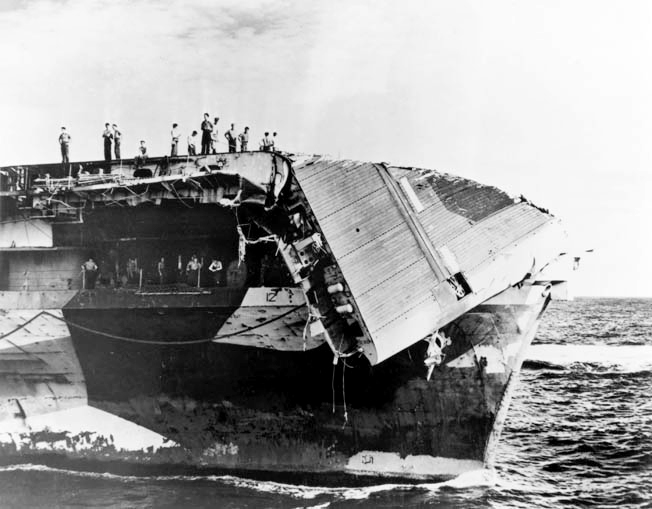
I liked sea duty. I was just thinkin’, I don’t remember now whether it was when we came back or not, but we got in a typhoon and I think that’s when it was, on the way back. One carrier, it rolled the flight deck up on it. The flight deck just lifted up. There was such a storm. We weren’t in the middle of it. The flight deck just rolled up. The wind got hold of it and pulled it off.
But the fleet was split up even then and we were goin’ in three different groups. Now that mighta been the whole Third Fleet was comin’ outta there, I don’t know. But our Task Force was 38 I believe they called it in our immediate group. But I’m sure that’s when that happened, though, when we was on the way home when we hit that typhoon out there.
An aircraft carrier won’t jump and jerk, but it will roll. That’s, the big thing. I could never understand, those pilots would go up there and dive around, but one of them slow rolls would make ’em sick. I never did get sick enough to vomit. Them soldiers, whew, they were layin’ all over, they had vomit all over the stuff.
A lot of people can get seasick. Now a slow roll I have got, over a period of time I got a headache. Roll, roll, roll, roll. Even in your bunks at night you just roll, roll. But one of those tin cans, a destroyer, I’ve seen all of the underneath of them suckers comin’ out of a wave. They come right out and hit another one.
And you’ve got what they call swells out there. You look over a carrier deck there and it looks like you could put the City of Jackson down in one of them swells.
A big ship it don’t bother as bad as it does a small. It didn’t jerk around. The roughest water that I think I was in when I was there was down there off of Cape Hatteras. It’s rough down through there. It did more knockin’ that ship around than any place I’d... But now in the middle of that typhoon out there had to have been somethin’ else, I’d say. But we weren’t in that. We got some wind from it, but nothin’ like that.
We came back to San Diego. Took us seventeen days to get back. We didn’t stop at Pearl Harbor. We came straight to San Diego.
That was when the doctor sent me to the medical center. I had a choice to go. The wife was in Washington, so I was gonna go there. I picked the Naval Medical Center in Washington D.C. to go back up there. She was workin’ in the Navy Department. Those steel decks are not the easiest things on anybody when you was doin’ a lot of...I don’t know whether that’s what caused it, but I had some, well kind of varicose veins, they got big down through there. So they took me in there and cut it off up there and they collapsed it. I never had any more trouble.
Left all my buddies in San Diego. Everybody went their separate ways. A lot of ’em had been drafted and when the war was immediately over they could get out right then, you see. So what I’d done, I went in for four years and I extended for two and got caught for a year. There wasn’t any way to get out cause I wasn’t drafted in. I had to stay a year after the war was over.
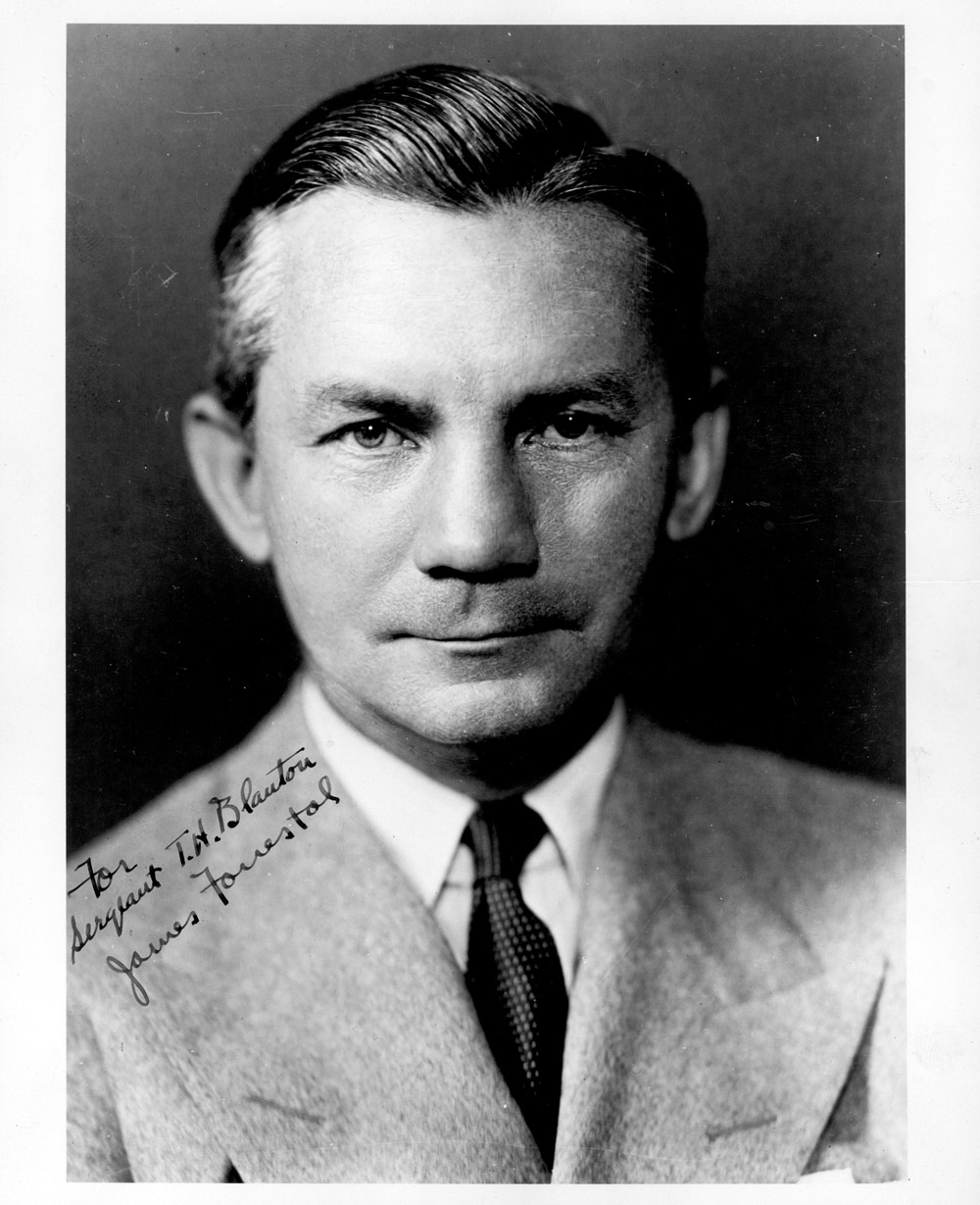
That’s when I went to the Navy Yard in Washington D.C. I had never really been assigned anything till the Admiral found out I was back and he sent orders down to bring me up there. Navy Department, right back where I left. The Marines had the guard, all the security of the Chief of Naval Operations and the Secretary of the Navy.
I spent a year there, practically the same duty I had before I left. I believe they cut the force. I believe after the war I was the only one left, that I remember. Security guard and that time they moved me in and give me a desk inside the Chief of Naval Operations office. Admiral Nimitz autographed his photograph for me. Halsey was a tough one, though. He’s the one that didn’t sit behind a desk. He was out there with ’em.
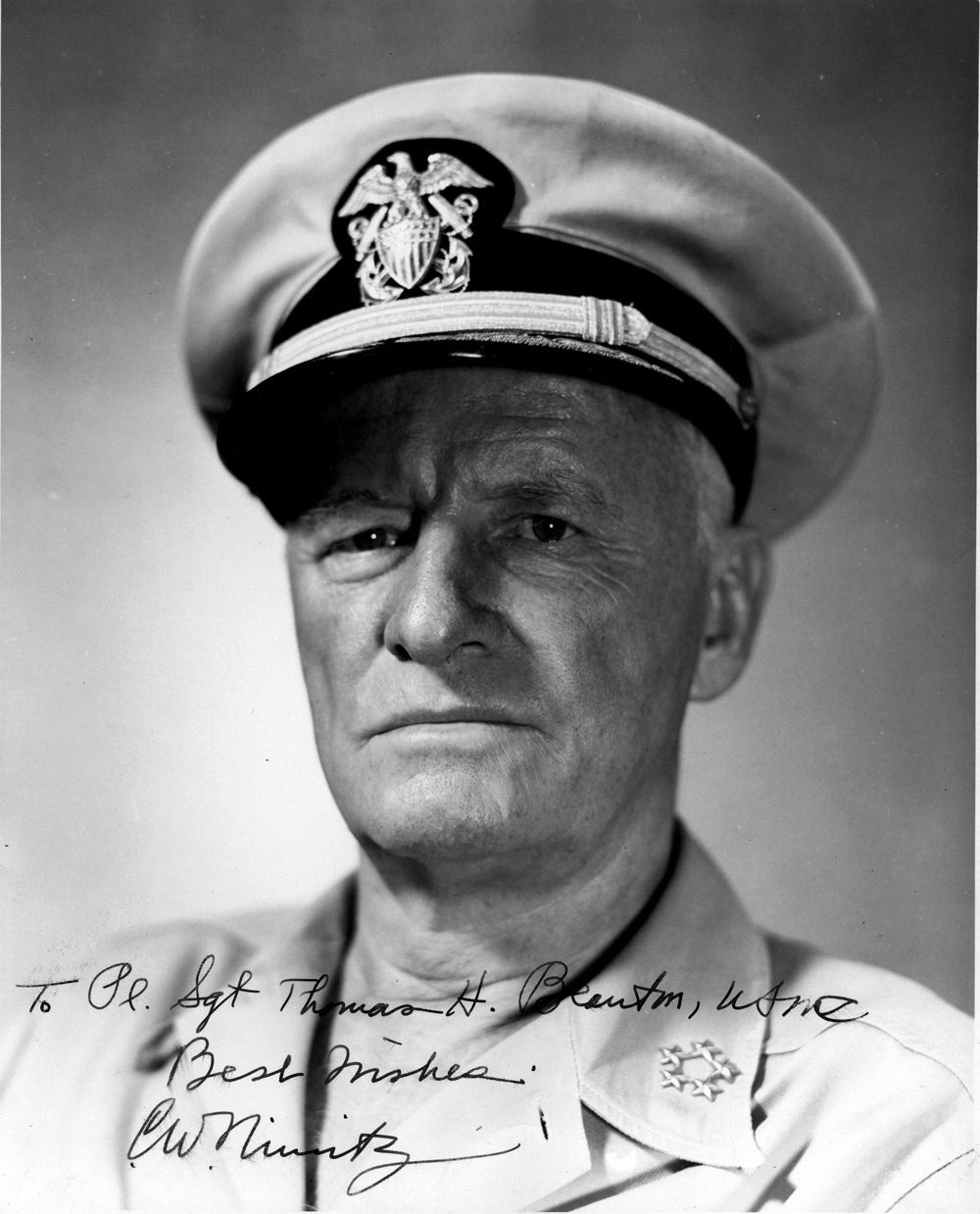
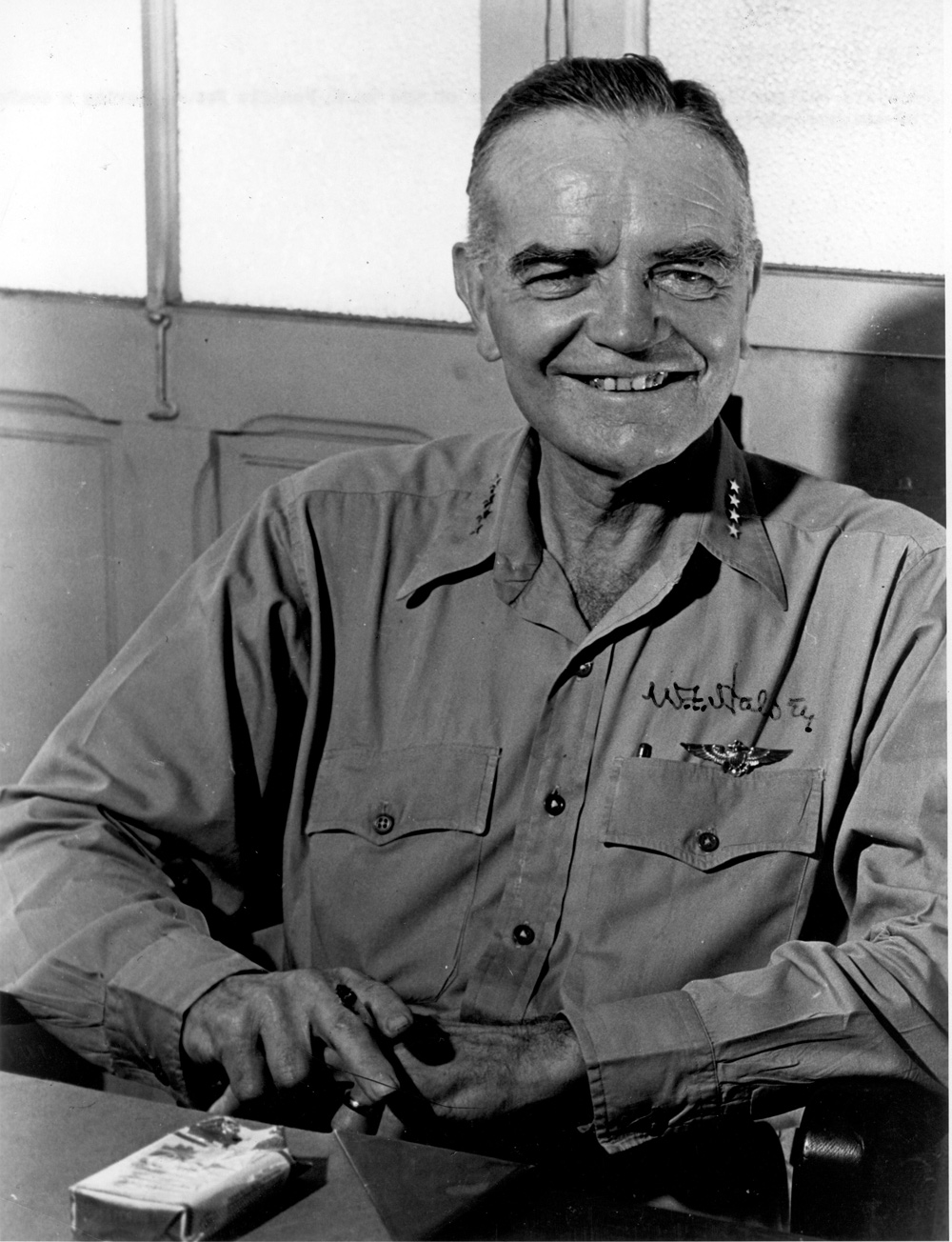
I got out of the Marines on August 30, 1946. I got a job at JISCO as a laborer. I worked there for I don’t know maybe a year and then I was at apprentice brick layin’ for for four years. I laid brick for several years after that. When I left JISCO I went out on schoolhouses and construction. And I think the most I ever made workin’ at public works was four dollars and a quarter an hour.
I’m satisfied with my life. My father was a trader in cattle buyin’ and stuff before me, only he used to drive ’em on foot. Get a couple hundred a head and drive ’em together, went up to buy ’em, and take ’em down to Mt. Sterling, Kentucy. I use trucks for mine. I got into the cattle business as a sideline when I was layin’ brick. But when it got so big I had to give one of ’em up, I give up the brick layin’.
Then we bought a stock sale up at Athens. I still keep cattle, but I mean, I used to run a couple hundred head all the time. I think one of my biggest years I might have grossed a million, but I know the IRS came to me one time and said you have an awful lot of money. I says let me tell you something. You don’t make money everyday. Some days you lose money.
I still got a couple of farms, but I guess you’d call me, gotta be semi–retired anyhow. I wouldn’t advise any young man to go into farmin’. I didn’t make what little I got outta the ground. I used to have a big business of furnishing feeder cattle for those boys up north, trailer loads after trailer loads, worked on commission, trucking and commission.
8—Questions and answers
Q: Among the Marines you were with, how important was alcohol?
I didn’t think it was a big problem with us, with any of my buddies. They was some drinkin’ of course, but as far as causin’ a lot of problems I don’t think it ever did them. Out of that many people you’re gonna get one that gets too drunk and has to go to the brig or somethin’.
Q: Are you referring to the Marine Barracks in Washington?
The same way on board ship. Of course there wasn’t any alcohol on board ship.
Q: That was going to be my next question. Did they have any booze on the ship?
No. We didn’t even have beer on the ship.
Q: I had heard somewhere that...
Now they might nowadays, I don’t know.
Q: ...in the Navy there was a grog ration, but apparently not in the American Navy. That must have been in the British Navy.
It could have been. We had no alcohol aboard ship except for medical reasons. Now when we was on the shakedown cruise, we had a beer party ashore, you know, but not on the ship. Of course, we didn’t have any in the barracks at any time.
Q: Was that prohibited in the Marines?
I don’t think at that time it was allowed on government property. It was against rules and regulations. I’m sure it’s changed some now. I think you can buy a beer in a PX now. I’m not sure.
Q: You hear a lot or you read a lot about the Second World War about how important buddies were to you, especially when you were in a combat situation. Did you find that to be true also, that you had to depend on buddies and your buddies depended on you, and how did that all work out?
It was very important because, just like on the gun that I was on. One man would foul up and you had to depend on him to put the ammunition in there and if he fouled up you lose one barrel of your gun.
Some people are only human and they’d freeze up sometimes. We’ve had several people do that. They just...they’re stunned, you know. We had some black people that had the twenty millimeters on ship and they just fired their magazine on out. The planes were already gone. They just kept on firin’.
Q: Did you pal around with these same buddies from your gun when you were off duty or did you have other friends?
Usually there’s a little segregation in there, like non–commissioned officers would usually run together pretty well.
Q: Okay. You have your privates and then you’d have your non–commissioned officers?
Yeah, uh–huh. The first sergeant, which was two ranks above me, him and I were big buddies and the other platoon sergeant and the buck sergeant. Not that we didn’t, you know, if we were out on liberty, we wouldn’t have a drink with ’em or something like that. But as a rule your buddies went kind of according to the rank.
Q: Your quarters on board the ship, on board the Shangri–la, were they with other sergeants or were they with your troops, the Marines?
I was with my troops. Now the gunnery sergeant and the first sergeant quartered in the chief’s quarters. That’s the chief in the Navy, I mean.
Q: They’re non–commissioned officers in the Navy.
Yeah, yeah. But I know that one time they tried to pass the rule where they would take in the platoon sergeants, but they never got it done. So I stayed with the Marines.
Q: Referring to your shipboard duty, was there any kind of a newspaper? Some of the people that have talked to me about Europe talked about the Stars and Stripes newspaper. Did you have that in the Pacific or anything like it?
I don’t recall havin’ it out in the Pacific. Now it might have been in locations on land. But they published a little ship’s paper. It told news and so on.
Q: Did you have any reaction as to whether it was accurate news or inaccurate news or rumors or could you tell?
Most of it we took it was the gospel truth.
Q: Did you find out later whether it was gospel truth or not?
I didn’t run into anything that was way out of line. I mean it wasn’t that big of paper, you know. I’m talkin’ about a small paper.
Q: Did they have any news on your movements or was that kept out of the news?
Oh no, you didn’t do anything like that. I mean there was no...
Q: The results of a battle?
Well, after the battle was over, like losses and the casualties and all that stuff you would see in there, but as far as any forward movement, you didn’t know what was goin’ on next.
Q: Did they get the losses right when they reported battle losses?
I wouldn’t think they were off too much. I had no way of knowin’ except what you find out later you know and everything. I always thought it was pretty accurate.
Q: All right. About when the Franklin lost its folks, was that reported in the ship’s newspaper? Full casualties and you got pretty much the full story?
Not name by name, but I mean numbers. I probably got one of those layin’ around somewhere. I don’t know whether I’ve got that or not.
Q: The reason I ask the question is there’s some folks are criticizing what went on in the Second World War in part because some people think the news was distorted.
If it was distorted any at all I would have to say it was casualties caused by our own troops.
Q: Distorted up, you mean?
I mean that they didn’t mention. I mean shot down our own planes and kill our own people. It was a mistake, of course.
Q: Did you see that happen?
No, except I remember one night we were firin’. We had patrol planes up, and as far as I know we didn’t knock any down, but he broke silence comin’ in and told us who he was. We immediately quit firin’ after that. I don’t think we knocked any of ’em down. We were just firin’ at a bogie that was friendly is what we were doin’. I’m not to blame for that because I was gettin’ orders from the Captain to fire when you was supposed to fire, when you get a target. Some of those bigger guns you know you fire by radar. The five–inch gun was fired by radar.
Q: What about the shore troops? Did they have lots of mistakes with them, accidents with them?
I’m no eye witness to none of ’em, but there’s rumors that they were. You probably noticed in the paper the other day when they was firin’ out on the range, when they were just training, they had too much powder in a gun and it went on over and hit troops. That’s another one of those things that I don’t think was done intentionally, but it probably did happen.
Q: Part of what the ships were doing was laying off shore and putting in fire into the inland, and some I suppose would fall short?
If they don’t get the right distance, why you can easily do it. You got men on the beach, and you’re tryin’ to fire ahead of ’em, and that could easily happen. If you fire too short, why you’re gonna hit your own troops.
Q: I believe you said you went ashore to Japan.
We were in Yokosuka. It’s a naval base, a submarine base there.
Q: What were the feelings toward the enemy population at that time?
Well, the funny part, always struck me, I don’t know where all the men were, except old men. I don’t know whether they took the soldiers out or whether they disappeared. The old men and the children and women was the only thing I seen.
Q: How were they treated? Did you have anything to do with them at all?
They were just on the street goin’ about their business. Now we had some rifle fire one night in there. We never could locate where it was comin’ from.
Q: Somebody was firing on you?
Yeah. We had no casualties from it. In fact we didn’t have any casualties when we was on occupation duty over there.
Q: Nor, I suppose, did you inflict any?
No, no.
Q: You were just securing the base.
We were just securing the base. I suppose they had orders to leave. I know they left everything clean. We used their barracks while we were there, and it was as clean as a pin.
Q: Did you see any military prisoners? Japanese prisoners?
No, I didn’t see any.
Q: Okay. How close did you get to the atom bomb site?
I don’t know how far that is from Yokosuka. What was it? Hiroshima, wasn’t it? One of ’em.
The only thing we seen, we did take a trip up to Tokyo for a day or two there, and there wasn’t anything standing in Tokyo except a real strong building or something somewhere. It looked to me like it was pretty well flattened, all of it was.
Q: Literally rubble?
Uh–huh. Now there in that place where we occupied, they had, when you go inside one of the buildings, even after you got inside, they had concrete bunkers made in there with slots in ’em where they could shoot a machine gun. That’s when I say if we’d a had to took Japan without the atomic bomb we would have lost millions of men.
Q: Because they were so well entrenched?
They were well entrenched and the attitude they had toward life. They’d rather die than to give up. Somebody, after seein’ what the atomic bomb done, all of ’em had to been crazy to keep on goin’ then.
Naw, I don’t know how close we were there. I’ve got a brother that was out there and he was pretty close to some of that. In fact the Veterans’ Administration is checkin’ on him now to see whether he’s comin’ up with anything, cancer or somethin’. I don’t know how that’s gonna turn out.
Q: What do you think about the Japanese people today?
I have kind of an open mind, but I can’t feel like some of ’em feel. What I mean is they’re the ones that done the dirt. Of course I know we got a new generation out there.
The guy that President Bush went over there and bowed to is the man who maybe could have stopped it, and he didn’t do anything about it. He was in there then, and I can’t understand why they would honor a man that would kill all the American people he killed. It don’t make sense to me. Not that we should go over there and kill ’em all yet. I don’t mean that. But I don’t think we should of, in fact, when I look at it, I don’t think Japan lost the war—now.
Q: They look pretty good now, don’t they?
They surely do. And through our help. Now I still, just because they lost the war isn’t no sign we should keep on treatin’ them like animals or anything, but I’m not sure that we worked that just right. I mean I’m not too much to hold a grudge or anything like that, but it just don’t seem like it’s exactly right. All the American boys and nurses and other people that was treated the way they were treated.
Q: Is that still on your mind is it, when you hear about Japan in the news?
It bothers me. It wouldn’t bother you like it would me, I’m sure. Because we know it did happen, and they were almost inhuman. That’s the way they treated people.
Q: Did you come across any recovered POW’s, American boys that had been in Japanese hands?
Just in the hospital is about the only place. I came back to Washington and I had a little operation on the leg, and there was several of ’em in there. I don’t think you’d find very many of them that really would approve of the things that’s happenin’ between the United States and Japan today.
Q: They’d resent the Japanese, obviously.
I would think so.
Q: Yeah, they’ve got something to resent for.
More so than I would have a right to in a way, except I had a lot of buddies killed out there. Of course, I have no idea what those prison camps was like, down in the Philippines, and the famous march they always talk about. If you couldn’t make it they just shot you and went on.
Q: What about race relations on board the ship? You indicated that some of the gunners were black and that indicates to me there were some black sailors on board the ship.
They were all mess cooks, kitchen help. Took care of the officers, more or less. Had their own compartment, and it was pretty well segregated in those days. In the Marines they didn’t even have any of them. They had their own compartment. I know they come down there several times, the officer of the day would, and one squad of Marines said they was fightin’ up there in the black department. They said they had knives, razors and everything else down in there. They’d go up there an back ’em down, take part of ’em to the brig. I’m not a racist. I mean, I don’t feel that way toward black people.
Q: Do you know whether they got the same pay as other sailors or would they have got less or do you know?
I wouldn’t want to make that statement. I don’t know. I woulda thought they woulda got the same, they had a rank just like we would have, you know what I mean.
Q: Same ratings?
Same ratings and everything, but I don’t know that I ever met a black chief in those days. A Navy chief. There mighta been. We didn’t have any black officers, not in our outfit. Of course there were black officers. You know that. In the Army. There wasn’t in the Marines, because the Marines didn’t have any of them. I don’t think they drafted any blacks in the Marines. They could have. I don’t know.
Q: You didn’t see any.
I didn’t see any.
Q: How did they end up in the anti–aircraft guns then, the blacks?
Well, that was the smallest gun on there, or that we had.
Q: You mean that was their battle station?
That was their battle station.
Q: When they were not at battle stations they were cooks?
Yeah.
Q: And when they were at battle stations they had those small guns?
Small guns. I don’t know whether we had enough to man them all or not. I don’t remember that, but that was their battle station. The twenty–millimeter was just a single barrel with a big round magazine on the side of it.
Q: And that was for close–in work?
Close in. Yeah, they would only go...shoot, I knew how far their effective was back then. You could see them go out there and be involved pretty well. I imagine with the tracers and everything you could see how far they were goin’.
Q: Do you have a sense of how many airplanes your crew was responsible for shooting down or how many you saw go down in battle?
We got credit for some, but now who got ’em on the ship, you know...
Q: You explained before it’s just a sheet of flame going up and you can’t see exactly who was shooting what.
I don’t see how they would determine it was one individual gun gettin’ a plane. We knocked down several as far as that’s concerned, but as to who done it...I know the ship got credit for some.
Q: Would these be dive bombers or torpedo ships or kamikazes or all...
All mixed up. A lot of those kamikaze would come in single. You’d think the battle was over, or even before the battle started. I mean you know, just to kind of get your mind off of your business. As I told you the other day, I think we had more suicide planes come at us the day after the war was over, was supposed to have been over, than we had any day before. I think they sent ’em all out then, or they got in and come out.
Q: What were your thoughts and conclusions about the Korean War when it came on?
I really didn’t understand the war. I mean of course I was home tied up in makin’ a living, and that’s the one that was supposed to have been a police force to start with, wasn’t it?
Q: Uh-huh. We’ve had, I think we’ve had a couple of those, but this was in there.
We went over there to bring peace and then we got into it all over. Same way in Vietnam, I think.
Q: I was going to ask you about Vietnam next.
That Vietnam, I’m bitter against that deal.
Q: What makes you bitter against that deal?
I think it was plain stupid. When you draw a line and you rub that line and they throw rocks at you and you can’t throw back, you cannot win a battle. I think we coulda won that war in a month, but we would have had to have been terrible people. We’d have had to kill a lot of civilian population. We could have bombed that place off the map with all that equipment and planes we had. Look what they did. They lost fifty some thousand boys over there. And you were fightin’ a civil war the way I understand it. You couldn’t tell the enemy from the friend.
They could infiltrate you and get right in there and blow you up or anything else. Now they fought more like the Japs, I guess, than about anybody, from what I can pick up from some of the boys. No, I think the people were right back here at home when they was against that war. I don’t care who the president was or who got us into it or who got us out of it, but it was still wrong, I think.
Q: Bad deal?
Bad deal.
Q: What are your thoughts, we’ve got some problems going in Central America now?
I have mixed emotions about what’s goin’ on in Central America. Are we gonna be the police force of the world? Or are we gonna let these countries run their own business? I’m this kind of a fellow -- if we’re gonna do it, let’s get in and get it done ’cause in nine times out of ten, if you fool around you’re gonna lose a lot more men in the long run. Now down in Panama, with just a little help, we could have got rid of that bird, I think. If that’s the idea, but do we have a right to go down and get rid of him?
Q: Referring to Noriega?
Yeah. Do we have a right to go down there and tell another country how it’s gonna run itself? Of course the Panama Canal is a must for us. We’d have to go to war over that, almost. Of course it would be a financial war, that’s all you could call it.
Q: Yeah, but I’m not sure that the Canal is really at stake. I don’t think it was ever really at stake. I think what’s bothering them is this fellow Noriega.
I don’t know. Drugs and so on. But, down in Nicaragua, same way. If we want to stay continuously in a battle and all these little countries ever since time begin they’ve been fightin’, we could find somewhere to get in.
Of course you can’t live isolated in the world any more. I understand that. But, suppose we just let Nicaragua do what they wanted to do, Panama do what it wants to do. We can’t let ’em close the Canal, but other than that just walk away from ’em, what would happen?
Q: Conceivably somebody else would walk in, I suppose. That’s what they’re worried about, that the Soviets would walk in if we weren’t there. I suppose that we’ve got some fruit company interests and things like that down in Central America that I suppose they’re protecting, but other than that I can’t answer your question.
Isn’t a lot of these wars, though, really based on finance...money–making things? Now there’s a lot of interest there. The government is not supposed to have a lot of its money down there, but we’ve got a lot of people in this country that’s got a lot of money invested down there.
I’m not sure that we should sacrifice a boy’s life for somebody else’s gain. I’m not sure that’s the way to go. Now we’ve been foolin’ around with those people for years and years and years down there. It’s like over in Vietnam or any of those places, but what good have we done or what good are we gonna do, unless you make a decision and go straight down the line? This is the way it’s gonna be and forget it. Of course it might be wrong. That’s better than foolin’ around all the time.
Q: That’s the Marine way of doing things, isn’t it? If you’re going to go in, go in and get it over with.
Yeah.
Q: I believe that’s why they do assaults on a hill. They think if they do the assault they can get it over with and you have fewer casualties than if you fiddle around.
Well, anytime you do that I think, when you’re talkin’ about a military operation, if you want to play with it, the longer you play with it the more casualties you’re gonna have. Although some of those beaches were awful tough to take and we lost a lot of men. Your first burst is going to be bad. You’re going to lose a lot of men. But if you drag it on and try to hide behind the tree and it goes months and months, you’re gonna lose more. If you go in determined to do it and get it over with, I think that’s the way to do it.
Q: I think you also expressed a reluctance to get involved unless there’s a good reason to do so?
I question if we can go around all over the world and tell ’em what kind of government they can have and what right we have to do it.
Q: What reaction did you have when we lost those Marines in Lebanon recently? We lost 241 men.
I didn’t like it. I think that was stupid. Put those boys in a place like there. A lot of those Marines didn’t even have their guns loaded. They were sittin’ ducks. I mean that guy that came in there. The way I understood it, loaded, he could have stopped that truck. By shootin’ the driver. Or maybe he would have stopped it.
Why you put a bunch of men in a place like that, as dangerous as that was? For what reason? I mean those crazy people over there are not...just because you’re an American, you’re not gonna scare ’em to death. You’re not gonna say put a man in the middle of the road and say you ain’t comin’ through here. He’s comin’.
I think it was a disgrace, ’cause that was just like shootin’ pigeons the way they had ’em hemmed up there. We’re gonna have a lot more of it if they don’t change their way of doin’ things. You get a country like Iran down there. How you gonna handle ’em? I think isolate ’em or quit doin’ business with ’em. That’s the best way. Leave ’em alone.
These American people that want to go down there and get caught, I don’t think we should lose a thousand men tryin’ to get ’em back. Cause they know it’s dangerous and they’ve been warned of it, and if they go down, then they’re gonna have to find their own way out or take the consequences.
I don’t think of all the wars that have been fought (now World War One I don’t know anything about) but I don’t know how we would have...now it might have been political partly, too. But I don’t know how you woulda stayed out of World War Two. From what I can find out, you got those people in Washington hollerin’ peace, peace, peace at the same time they’re bombin’ Pearl Harbor. I don’t see much way around that. Of course the European war, I guess if we hadn’t a got into it, why he’d a come on into England and took the rest of ’em one at a time.
Q: I think Hitler declared war on us before we declared war on Hitler. We declared war on Japan and then Hitler declared war on us.
We were a little bit slow gettin’ into it. I remember that.
Q: American Legion. Did you join the American Legion when you got out? Have you joined it since? What’s the reason?
No. I don’t know. When I came home I left the war. I started a new life, and I’m surprised I’m doin’ what I’m doin’ now. That was a phase of life that’s gone by. So I didn’t, not that I don’t approve of ’em, I mean anything like that, but I just never was that much interested in organizations. I donate to the Veterans’ organizations and help ’em any way I can. It’s just one of those things that I felt well, the good Lord brought me back all in one piece, and if I can help anybody I’ll help ’em now. I might be able to help in there some way, I don’t know.
I’ve got a deep feeling for a veteran, especially one that was chewed up or anything. I mean I don’t think the government can do too much for him. Without them you wouldn’t have the freedom you got now. I think sometimes we’re awfully quick to forget it. When the scare’s over, it’s those men that are still sufferin’.
A lot of ’em it really messed up their mind, especially that Vietnam thing. That tore ’em all to pieces. I don’t think World War Two was as bad as Vietnam, from what it tore up the country and what it messed up people’s minds. Of course we lost a lot more men, but we had a lot more territory to cover than they.
Q: National Rifle Association. Do you belong to that?
No.
Q: Do you have any guns? How do you feel about guns these days?
I’ve no objections to huntin’ guns, but I’m strictly against handguns.
Q: Why is that?
Without the handguns you’re gonna have less murders. You don’t take a rifle downtown, as a rule. Or a shotgun. But you can stick one of those other guns in your pocket. I think if we would outlaw these handguns, and a lot of people wouldn’t go along with that at all. You’re takin’ a privilege away from your rights and everything else.
But why do you need a handgun for? You don’t hunt with ’em. If you’ve got a rifle or a shotgun in your home you can protect your home with it.
Why have a handgun? Cause, the reason they use a handgun is you can conceal ’em and nobody knows you’ve got one.
Q: Has this attitude got any relationship with your military experience?
Ah, no. I think what’s brought this on in my mind is so much crime has been committed by handguns. I’m not sure it has any connection with...I mean I had a .45 automatic about all the time I was in there.
Q: I recall that, and that was why I asked.
I never shot nobody hand–to–hand with it or anything, but I suppose if the thing came up, why you might have done it. But in a situation like that, I wouldn’t have felt too much remorse a shootin’ a Jap under the circumstances. Cause one thing for sure, if you didn’t shoot him he was gonna shoot you.
Q: Did you feel a hatred of the Japanese at the time you were in battle with them, or he was just a target, or how’d you feel about him?
You sink a ship that the Japs are on or somethin’. You’re not gonna just go out there and shoot ’em like clay pigeons. You’re gonna give ’em...the Americans would do it that way, but the Japs wouldn’t do us that way. Like parachutes, you get hung in the tree, they just go up and shoot him while he was hung in the tree. But I don’t think the American people did that. We didn’t do it. If you picked up survivors or anything you didn’t...we didn’t do it on our ship because our ship was too big to be involved in anything like that.
Q: Did you see other ships picking up survivors?
I can’t say I ever seen ’em pick up any Japs. We picked up a lot of our own men, of course.
Q: There probably weren’t too many Japanese survivors out of those battles?
No, there wasn’t. When you’re in a fleet like that you could be ten miles or maybe twenty miles inside, the carrier would be, and all these other ships would be out there another twenty miles. A kind of a haven in the middle there. ’Course if they get through then you’ve had it.
Q: Right.
They try to protect those carriers because it’s too big a target. I mean if they do away with the carriers, the planes don’t have no home. They either gotta ditch or go on some other ship and you can only get so many on a carrier.
Q: My wife wanted to know what happened to the corporal that shot the fellow in Marine basic training.
He was court martialed and sent to...I don’t know the name of the prison. I mean well, it was a federal...
Q: Went to military prison?
Yeah. Now I don’t know how much time he got out of it or anything, but those things did happen some. It’s nothin’ to be proud about. I mean, well, they could go berserk.
I don’t know whether I told you about it or not, but just like the guy that, he went. We was under attack one day and I didn’t know anything about it till after the attack was over. He had all the life jackets he could get around him, and he had one of those Marine knives. I don’t know whether you’ve ever seen one or not, but they got a leather handle on ’em and they got a scabbard. He was gonna kill everybody because they had his life jackets. He just went off.
We had some guys that disappeared. Whether they jumped over, committed suicide, or whether they were pushed over or what, nobody knows. Not many. Not many. Very few out of that many people. But they’d do it, and a man will crack. You would see that. If he gets under enough strain. If you get scared once, you get over it and then you don’t have nothin’ to worry about. But if you get up every day and you think this is gonna be your last day on this earth, it will work on you after a while.
Q: Is that what some of those boys felt?
I think so. A lot of ’em would, you know, you’d be talkin’ with ’em and they wasn’t gonna make it back home. This was gonna be it for them, you know. It gets into their mind. Of course a lot of ’em were wrong. A lot of ’em come back. A lot of ’em didn’t.
Q: Were you able to keep your mental composure pretty well?
I don’t think I had too much problem with it. I was scared. I won’t deny that. I mean a man ain’t human that won’t get scared. He’s seen death all around him.
Q: But you didn’t have a dread all the time?
Well, it’s like a lot of other things in life. At the time it’s real serious and then when the danger gets over, why you get over it. It’s like grief. You don’t go on grievin’ for the rest of your life the same way you did the day it happened. Or you wouldn’t have any mind at all.
Q: Right.
But back in the early days of the Marine Corps, when you’re twenty–one years old and the training’s tough enough that it scares you, it ain’t no easy thing. But I’m sure they don’t do that anymore because there’s too many Congressmen’s sons and stuff in there now. And the media’s on the ball too much. You don’t hide nothin’ any more.
Q: They had a piece on 60 Minutes a week ago, I think it was, talking about the way the drill instructors are now. They’re not even allowed to hit anybody or not allowed to use foul language.
If you see a few of them old movies it would give some idea what he was. Call you everything but a white man, and right in your face. They really want to get you mad. They really want to break you down. They want to make a machine out of you. At least they did in those days.
I don’t think he’d get away with that stuff any more. I think they made some good Marines, some good soldiers in them days. ’Cause they worked, worked like clockwork, and now what they would do nowadays...I’m not sure if we had a war if it would ever fall together like World War II anymore. I don’t think it would.
Q: Well, I think those are very rare occurrences in history, period. It doesn’t happen very often.
That’s right. It was unbelievable that this country come together and arm ourself as quick as they did. I have no idea how they done it. But everybody was out to win the war that time.
Q: Now let’s suppose that back then and you knew what you know now, would you still have done it? Would you still have got in the Marines and then, being in the Marines, would you go the Pacific?
Oh yeah. Under the same circumstances. Because it was a must. Because as I told you the other night, I suppose I coulda set out the war here in the States. But I thought, “Hey, I’m no better than they are, so I might as well take my turn, too.”
Q: So you’re pretty satisfied with it and you’d have done it again?
I would. Under the same circumstances.
Q: If you were in command, would you have done anything differently? I’m talking about the big commanders, the fleet command and so on.
I never seen any real boo–boos made. I think those boys knew what they were doin’. And I respect ’em for it. Even the high–ranking ones that made the plans, they outsmarted ’em several times.
Q: Put you where you could fight?
We tried to make the Japanese think that we had a lot more ships out there than what we had to start with. We moved ’em around so they’d be sighted here and there, and they didn’t know the difference. If they’d a known how weak we were, for sure, I doubt if we would ever have whipped Japan. If they’d a just kept comin’ at us, because we didn’t have nuthin’ to fight back with.
I’ve heard it said, I don’t know whether it’s true or not, but I think we only had twelve hundred military planes then. That was ready for service.
Q: You mean at the beginning?
Yeah. That would only have been a drop in the bucket against Japan.
Q: How did your military service in World War II and your experience in the military, how did that affect your attitudes about yourself? Do you feel like you’ve got a certain amount of confidence?
I don’t think it really hurt me in any way, that is as far as my confidence is concerned. I came home with strong confidence in the United States and in myself. I thought if we did that we could do more. It didn’t bother me in that sense.
Q: My question here is how your World War II experience affected your relationship with your family. I think it’s pretty obvious from the way Mrs. Blanton has been participating, she’s very proud of your experience and proud to be a part of it.
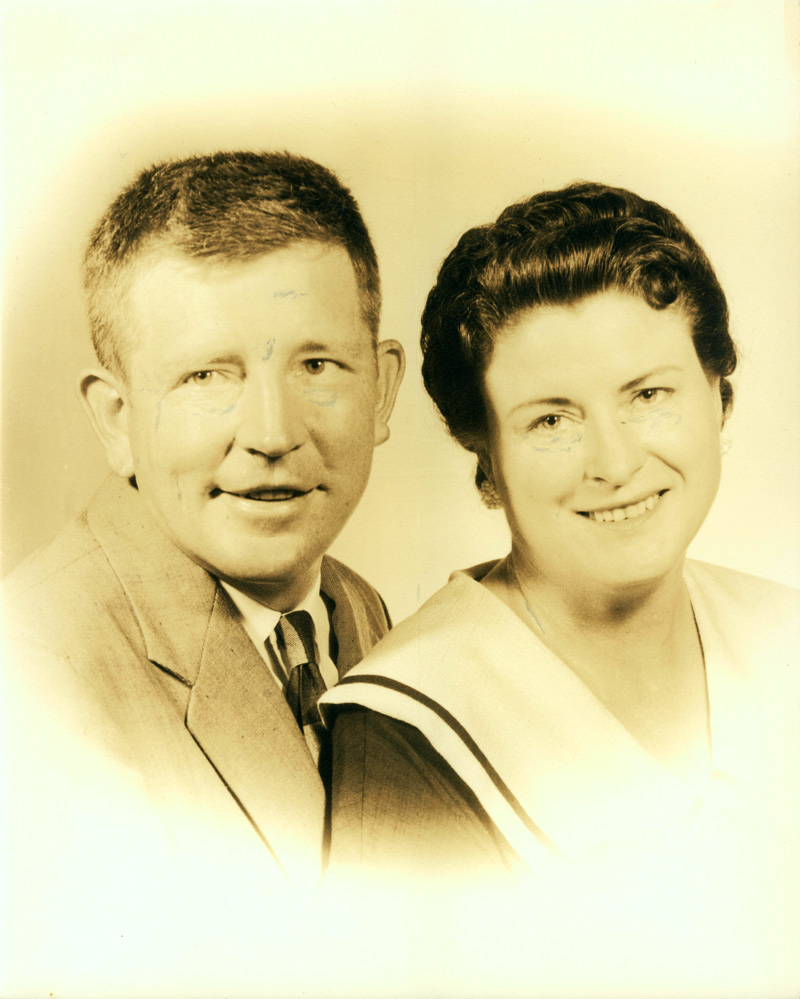
Oh yeah. We had no problem in the family in that respect. Everybody wanted to do their part and they were proud of what they did do. We were real lucky in the immediate family. I had a nephew that got hurt pretty bad in Vietnam, got a plate in his head, but, other than that, we never had no real bad casualties. Never lost anyone. Well, I’ve got relations that was lost, but I mean in the immediate family.
In her family the same way. She had two brothers in the Navy. One brother didn’t go. He worked in Columbus. He had a pretty good size family I guess maybe one reason he didn’t go. Right here in the county I knew several people that was deferred on certain reasons. I would have hated to been on that draft board, send a man out there.
Q: When you got out did you use the GI Bill, any of the benefits it gave you?
I don’t think I ever got a dime from the government in any way. I could have. Now wait a minute. Didn’t they give us a little bit each week for a few months or somethin’? Or was that musterin’ out pay? What they call musterin’ out pay. But they was a lot of programs set up. I did go up here in town and talk to a representative one time, and I think at that time I went to work at JISCO, about a farm deal program, and I remember what he told me. He said, “Well, Tom,” he says, “remember one thing. A farmer makes ten cents an hour for his work.” I said, “You’re an encouraging fellow.” Some of these boys went to school on the GI Bill, which was a good thing. I guess they bought homes and everything. We were fortunate. We had enough money to buy a home when we came home and give us a little start.
Q: I think most guys I’ve talked to mention the college work and also the mortgage they got off the GI Bill. When you came to the community from your World War II experience, when you became a civilian again, did you feel like the people that were left behind, did they get ahead of you while you were gone, or did you come back in about the same position?
I didn’t feel that way. I had a couple brothers had kind of a different feel than what I had. I didn’t really feel like anybody owed me anything. I thought I did my part. My brothers, I thought, forgive me if I’m wrong, but they expected too much. In other words I did it for you, now you keep me. You know. I didn’t feel that way, to that extent. I did what I thought I was responsible for and what I should have done. ’Cause this is my country and I wanted to keep it that way.
Q: Okay. Tom, I’ve come to the end of my questions. Do you have any concluding remarks you want to make while you’re on the record there? I can type it up for you.
I don’t. As I say, it’s been so doggone long I’ve forgot a lot of that stuff.
Q: Well, but you remembered a lot of it, didn’t you?
I remembered some. Tomorrow or the next day there may be somethin’ else pop up, but it is hard to bring that back after forty years, bring everything back, just how you felt. What I may be doin’ now is givin’ you some of my feeling’s now instead of then. Back in those days I might have been different. Not that I remember that I was. Not that I remember anything. As I say, I feel very fortunate because a lot of boys had it tougher than I did. I know that. Of course I could have been one of those boys.
I was in the same position they were. I would just call it luck, probably what it was. A lot of boys did come back. A lot more came back than stayed over. But I have no...I have regrets about a war, yeah. Why should we have a war to start with. But when you’re backed agin’ a wall you have to do somethin’ then.
Q: It’s like the Marine says, “You go in and get it over with.”
“Get it over with.” I think in one way I’ve got a little bit of a feelin’ that the Marines took an awful lot of the blunt of that war. ’Cause after you go in and take a beach and then you think you can settle down, out you go to another one and comes in the soldiers. That was a little bit, kinda unfair. I thought if you’d taken it on your own you oughta stay there. Of course they was trained for that. I mean they were trained to hit the beach. But I don’t know, they couldn’t train some of them. That happened so much out there in them islands. Then the soldiers would come in and take over what I called easy duty, cause all the resistance was done with.
I suppose there must have been some of those soldiers that took some of the islands to start with. I know they had soldiers in there. It seemed like all I heard about was after the Marines took it, why you can have it now, boys. Let’s go get us another one.
Bofors 40mm Anti–Aircraft Gun—a video
This is a film showing the 40mm gun in action on navy ships in World War II. Tom Blanton commanded and directed a quad mount in naval combat. Click on the arrow. There is a box on the lower right to enlarge the picture to the full screen.
photo acknowledgments
Many of the photographs in this oral history are family photos graciously lent by the Blanton family. Other photos are taken from the public domain. Google Maps images are gratefully acknowledged.
